#cuz of cultural differences between the two populations
Explore tagged Tumblr posts
Text
Forbidden romance but it’s a Resident orca and a Transient orca
#the joke here is that Resident and Transient orca whale populations don’t interact with each other#cuz of cultural differences between the two populations#they could interact#but they don’t#just an ocean fun fact#if you were a cetologist you would find this funny#this blog is about star wars but my other passion is killer whales#what if we were orcas from two genetically and culturally distinct populations#and we kissed
21 notes
·
View notes
Text
Space Bounty Hunter dr
This post is going to be long cuz ive inserted pics that remind me of this dr... I just wanted a place were I can discribe and info dump about the places I have and am shifting to. I thought about starting a page on shifttok...but its tiktok.. and I don't like the people on there lol. They all have weird takes; ex; the constant hate on perma shifting. Not only that but they hold their opnions up like they are truth, everyone puts creators on a high horse and they are just insufferable. So instead im here, on a hopefully way more chill platform.. Anyway i'll stop yapping about shifttok and get on with the actual post.
I have a large amount of space dr's one of them being a bounty hunter reality with a metroid, sci-fi comic, farscape kinda of vibe to it. I'd also compare it to cowboy bepop.
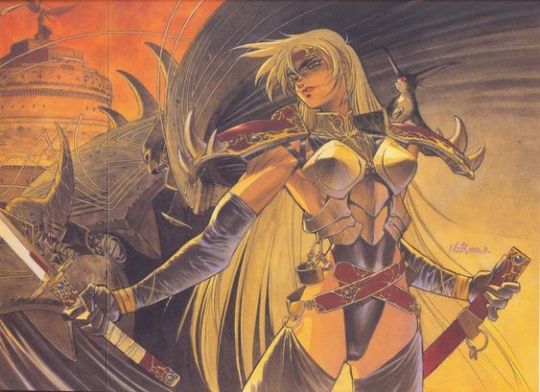
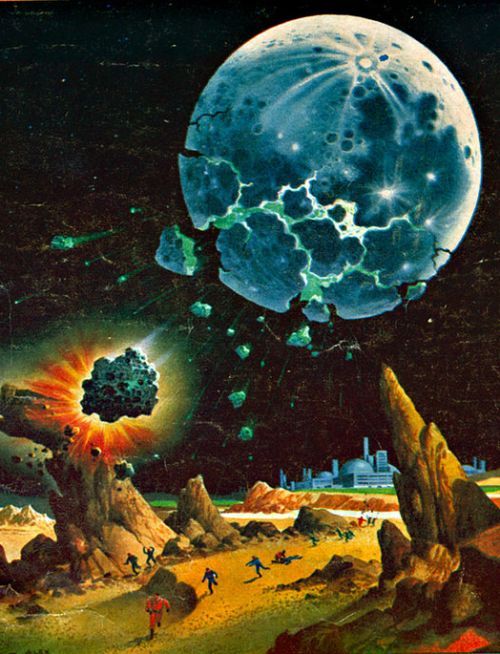
All of my adventures take place in the milky way far far from earth. I'd say for earth its around the 1990s, I've scripted out time diliation when travling far because I just don't want to deal with it. Keep in mind some of the physics and logic is different from this reality. Earth is unware of any alien species, space travel and literally anything outside its solar system. Even with earth being oblivous to the intelligence out in space people still travel to the planet. And Its the way my grand-parents traveled out into the universe. The Neashe (na-shay) have helped and rescued people from earths many wars (without earths goverment knowing) promising them a new life in the aven section of the galaxy. Lazuo is the native planet to the naeshe. Being one of the most technologically advanced planets it exports the most weapons and ships among the star systems. It has the highest population including its moon ilumi. The naeshe are welcoming & peacefull species beliving in the search for life in the universe. The reason the Naeshe have not tried to contact the goverments of earth is because of the leaders constantly engaing in war. There is many other planets that I might mention so if its a word you don't know or you get confused its either a planet, its species, or some galatic goverment name.
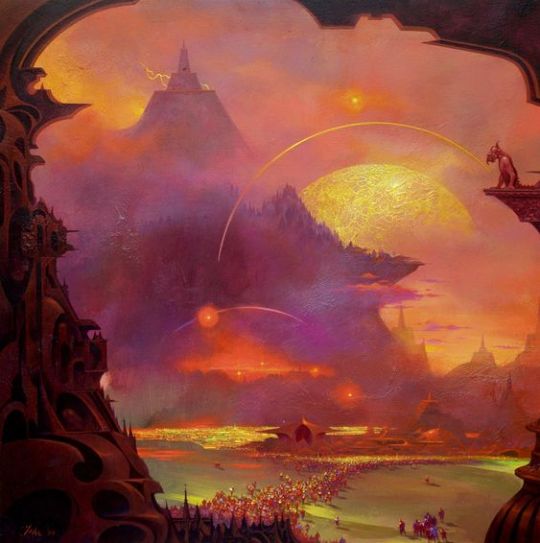
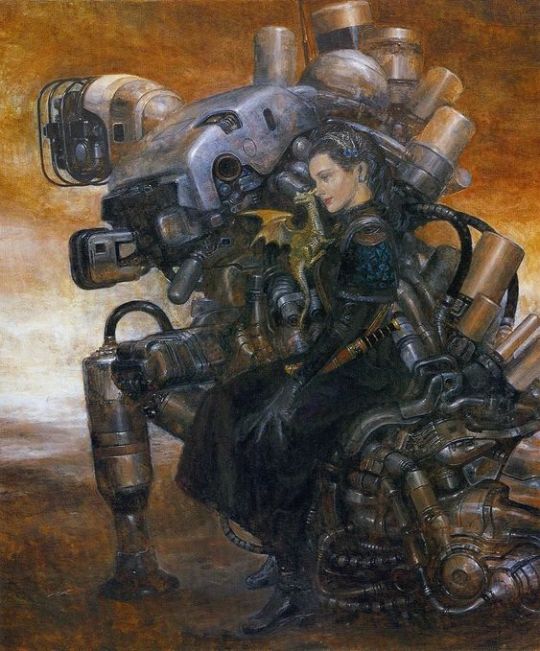
For many years there has been an alliance between planets called "aven" the Adu word for friend. Adu is a water planet, its culture built on avation, exploring the depths and its diverse sea food. Since this alliance was formed interseller ships from all over travled to and from planets, exporting and importing goods of all kinds. Even though this guild was there to hold a title of saftey and peace it sprouted a problem. Space pirates, criminals, theifs, whatever you want to call them started to raid and attack these ships. Law enforcers failed to keep up with the rapid apperence of these pirates resulting in high rates of crime. Fed up with the persistent violence, people from all different cultures and planets volunteered to help capture these criminals. An association of bounty hunters was formed named space stalkers. Contractors from major companies started to pay space stalkers for their part, devolping a large influx of hunters. Being a space stalker is dangerous but since I have free rain in what I can script I find it fun.

companions
My name in most of my dr's is Callisto Calavarni and thats the name im going to use on this page.
My mother Estette Calavarni and father Castor Calavarni are alive and well in this dr. I know shocking... I didn't script a traumatic backstory, GASP!!!! They rasied me opposite of helicoptor parents, encouraging me to take risks and learn as much as I can about the world. My friends are Wesley Starkov an astrobiologist from the planet Kelzo. Anvi An, a female doctor who mostly works on hospital ships. And Niko lovell with a John Crichton personality from earth. I also have a pet! A fluffy tuxedo cat named Miso.
I have a deeper connection to Anvi than anyone else, we have been friends since the terrible twos lol. But I have more amusing stories with Wesley. I prefer to work alone as working with some hunters can be risky. I remember I needed help with a bounty and had told Wesley that I would give him half the check if he assisted me. Long story short the hunt didn't go as planned and I had to run to our vehicle and jump through the window like a loony tunes cartoon lol. I ended up kicking him in my uncoordinated climb through the window and he's never helped me with a bounty since -sob-
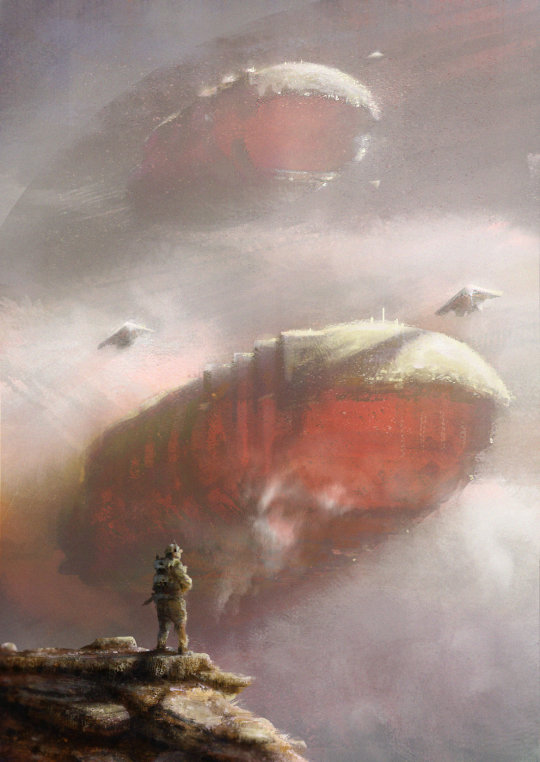
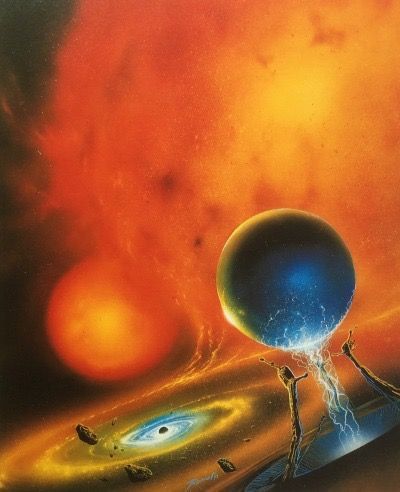
Thanks for reading, if I spelt anything wrong ignore, science is what im good at not english haha. This is my first post and im still new to tumblr so please ask me questions and tell me what kind of stuff you wanna hear about my dr's! Happy shifting!
#reality shifting#shifting#shifting stories#shifting antis dni#shifting blog#shifting motivation#shifting community#reality shifter#shiftblr#shifting diary#shifters#shifting to desired reality
25 notes
·
View notes
Text
Zora Worldbuilding Headcanons
Some core assumptions:
The BotW branch of the timeline is chronologically set AFTER the previous timeline, ie the events of ToTKs ancient past is set AFTER the last event of the Hyrule Historia timeline. essentially they all come back together to form one line that makes up ToTKs ancient era
The biggest effect on Hyrules topography was the flooding in Wind Waker. after an unknown point, the flooding ocean receded leaving behind the ruins of ancient Hyrule. at some point after that, the zonai settled parts of it and made the buildings wed see as ruins by the time of BotW. slowly the various tribes of hyrule immigrated back
all peoples within the setting of hyrule are loosely grouped into categories called tribes. in this sense, tribe refers a collection of peoples with shared traits, without anything concretely set in stone (for example, hyrule includes the tribe of hylians, the tribe of gorons, the tribe of koroks, etc etc. the main six who show up repeatedly can be considered the sage tribes (gerudo, hylian, sheikah, rito, goron, zora), and the various types of enemies can be considered the monster tribes (the blin tribe of bokoblin, moblin, bulblin, etc)
so with THAT in mind! heres shit that is almost entirely just Fun Background Context and worldbuilding that i mostly just rotate in my mind when working out events for that still-unnamed totk au
NOW UNDER A READMORE I FIGURED OUT HOW TO USE
@blujayonthewing @br1ghtpunk @trenchcoatofthelord
now in convenient bullet point form because if i dont organize points somehow my adhd ass loses the plot. this might get edited and cleaned cuz im posting this at 3 am
the zora are the tribe most heavily associated with the element of water. elemental water concerns not just the physical aspect of water, but conceptually is associated with the concepts of flowing time and change. as such, the zora show the highest degree of adaptation and physical changes
by the time of ToTK there are three descendants of Old Timeline Zora: the rito, who adapted with the help of valoo to achieve flight, and inherited the element of wind and forest from the kokiri, the "river dwelling" zoras that make up the current Zoras Domain and include Sidon, and the "reef dwelling" zoras that are further east in the oceans bordering akkala and include Yona. there are more than these 3 (only two of which are still zora as the rito have branched off so much and so long ago they are considered their own separate tribe) but these are the ones with the strongest presence in hyrule
the zora are very familiar with their own adaptable nature, and physical differences between different zora are rarely remarked on as its a matter of course. this typically confuses non zora when one refers to the rito as their air dwelling cousins, but to a zora this seems as obvious as the sunrise. some zora just evolved to fly, its that easy. they may not be fishpeople but theyre still cousins. zora rarely elaborate on this connection as initial confusion is misconstrued as confusion with regards to a zoras adaptable nature in GENERAL and not the specific connection between the birdlike rito and the fishlike zora
zora, overall, work on clownfish gender rules. personal physical traits can morph based on overall population and secondary sex characteristics adapt and change as needed. zora gender presentation, therefore, is completely divorced from sex characteristics and considered a matter of personal identification. clothing is essentially just fun accessories to jazz up your appearance. as such gender roles in zora society exclusively refers to whos doing what in procreation, but extrapolating habits, presentation, or identifying characteristics from those roles is deeply confusing. similarly confusing is the idea of differentiating relationships based on gender or sex characteristics (to a zora, all marriage is gay marriage).
well accustomed to change, the zora typically take cultural differences in stride and are known for their adaptable and friendly nature, though a perspective drawing root from the biology of fish exacerbated by an elf-like long lifetime means theres been a fair share of well meaning confusion and misinterpretations on their part.
the exception being the zora post calamity where, having suffered catastrophic losses and the death of their beloved princess, the zora of the domain reacted in their grief by becoming isolationist and traditionalist, in an attempt to staunch the flow of despair that was sweeping their lands. sidons ascension both as the champions heir in botw and the sage of water in totk metaphorically heals these wounds, helping the zora as a people embrace the everflowing nature of time and the changes they bring, as we must risk pain to fight for our happiness. by digging in our heels and keeping away, we prevent anything from getting better, letting the water stagnate. though the current may sweep us away, only the flowing river brings new life.
the zora, being the tribe associated with the element of water, react incredibly strongly to its presence. this is most visible with zora royalty. ancient tradition dictates the spiritual stone of water, the zora sapphire, be used as a wedding gift by the royal heir. proximity to such a powerful source of elemental water causes the zora ruler to grow steadily larger and more powerful as they age, as the spiritual stone is used as their marriage token. this is why the zora king is typically a massive individual, combined with the zoras long lives, one can get absolutely MASSIVE. this connection is also why the zora ruler is so powerful, as seen in king dorephan physically throwing a guardian off a cliff
following up on this, most zora cannot cast magic. the implied gender dynamics in sidons questline in ToTK deeply aggravate me and, imo, cheapen Miphas skills as a champion, as yona and other female zora are seen performing the same healing magic mipha was known for, and then purifying water in sidons place (so why is he even doing it if he can just take shifts??? anyways). adjusting for this, magic is, by ToTK, an extremely rare skill to have. even the presence of the spiritual stone does not imbue one with the ability and skill to cast magic dorephan may be powerful, but he is no mage.
in that vein: yona and her attendants have no healing magic. they demonstrate their compassion and dedication to helping with the crisis by tediously and thoroughly treating the sludge-affected and wounded zora in the domain by hand, scrubbing them clean and tending to them with non magical medicine. mipha was not born a sage, and in truth had very little magical power, and a shallow connection to the magical element of her people. what was remarkable was the sheer skill and razor point efficiency with which she used what little magic she had, generating returns that so outclassed her power that it seemed a miracle. this is why mipha was so short, as zora grow in proportion to their connection to water, and miphas connection was constantly stretched to its limit by her compassionate nature and determination to heal and save all she could
as a change to ToTK used in the au, and also a headcanon: miphas court was not always a source of water for zoras domain. once the sludge crisis began, polluting the waters around the domain, a wellspring of clean water sprung up as if by magic underneath her statue, flowing downwards towards the zora. the area is well explored, and there is no immediate logical explanation, leading to it being widely perceived as miphas final miracle (which is not far from the truth. vah rutah generates water from nothing, and even in death mipha cant help herself but to try and save her people, watching over them still)
zora religion is a matter of significant cultural importance, and to the surprise of no one, features a heavy emphasis on water. zora, overall, are deeply spiritual as a rule, and this shows clearly in their architecture and their noted tendency to dedicate massive structures to religious worship and celebration (and often time such structures work both as a spiritual source of worship and as a practical location with a designated function. nearly all water temples are explicitly religious, and they also tend to double as water plants in some fashion)
frequent interaction with the hylians has meant that the zoras have had PLENTY of time to comingle and embrace hylian culture and religious concepts, to a degree that often surprises and shocks your average unaware hylian. the zora are somehow more gung ho about hylia than even THEY are (hylian culture and religion are for another post, but in general hylia worship is treated as a subtle background element and is rarely brought to the forefront of active attention or behavior. by contrast, the zora have an organized religion focusing on her with a dedicated priest role)
the heavens above are a vast starry ocean, the dwelling place of spirits, and where the horizon meets the sea, the dead can cross over from one plane to another. the rivers below are a muddied reflection of the starry rivers above, and where life is brought forth in the waters below it transitions to a new form in the waters above. the shine of the stars is the glint of light off the scales of celestial zora, and reflective metals like silver help them find their kin in the lands below
"all waters meet in the ocean" being a zora idiom about how many different concepts will often lead back to one solution, and how many different peoples can find unity at a single destination, regardless of how dissimilar they may initially appear
an emphasis on the flowing mutable qualities of water is reflected both in the zoras conception of identity (prone to change as time and circumstance changes, both metaphysically and also physically) and also their spiritual practice, focusing on the nature of spiritual transition from one state to another
hylia thus takes the role of guiding shepherd in this instance, symbolically aligned with the sun. through hylias light, the spirits of the dead find their loved ones in the living world, who in turn can see the sparkling glint of their scales in the heavens. as disaster clogs the river and buries the dead, hylias light reflects off the water to help guide them to the horizon line
out of all the tribes, the zora have embraced hylia the most, and openly incorporate hylian iconography into their own religious symbolism, and through the generations have had their own dedicated priesthoods to her, a tradition which still continues, albeit more casually, to this day. zora churches to hylia are considered some of the most beautiful in the country
zora do not worship a creator deity and instead attribute their peoples birth to the amorphous and chaotic nature of water itself, though there has been many minor religious figures taking the form of guiding spirits who aided in their creation by guiding the malleable form of the zora into one more closely resembling their current state
included in these guiding spirits are historic protectors of the zora people, including the water dragon farore and the great fish jabu jabu
the shared heritage with the rito is attributed to the nature of leviathans, who both dwelt in the ancient oceans (jabu jabu) and also roamed the heavens (the windfish, levias) and is considered a minor fact of life not really exciting enough to dwell on
a fun little aside inspired by my replay of skyward sword: the water dragon being the source of elemental water sage magic for the zora, and the water dragon uses her power to imbue the lake she resides in with a kind of magical purity, allowing her to grow whatever she wants in its waters (ie salt content or lack thereof does not affect the lotus blossoms or coral growth, as they draw upon the magic in the water to filter what they need). she is the source of elemental water for the zora, and thus has the greatest mastery over it, demonstrating skills other sage descendants cannot yet replicate. in time though, sidon may be able to imbue small bodies of water with that purity, allowing salt and freshwater organisms to coexist when otherwise theyd be unable to
the waters of the divine springs are not elemental water but instead the divine waters of the sacred realm, and are instead closer to elemental *light* than anything else. the springs will never diminish, nor dry up, and are as deep or as shallow as needed
the zonais interaction with the zora was a bit of a reversal of typical first contact enlightenment. the zora have a long history of stellar plumbing systems and engineering, to such a degree that first contact resulted in the zonai learning and adapting zora blueprints and methodologies for the construction of the water temple sky island
26 notes
·
View notes
Text
Reigen gets a Smart Phone

Reigen thinks: When did they all switch to smart phones?

So does that mean I’m the only one still using a flip phone?
No... No that cant be, the main purpose of a cell phone is to communicate. In that respect, it does great. More functions are not necessarily useful. Most of it is just entertainment and pointless frills.
The battery drains faster, the screen is a lot easier to break and they’re more expensive.

Haaaaa!! Check it out Losers! Six super rares! Told you I’d get ‘em!
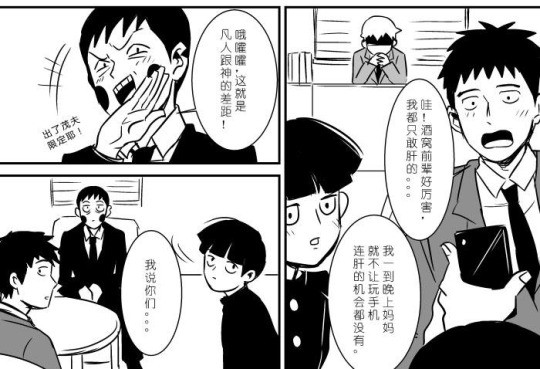
Serizawa: WHOAA!! Ekubo Senpai, you’re amazing! That’s so much grinding, I’m not even close.....
Mob: My mom won’t let me to play on the phone at night, so I never get the chance to grind.
Ekubo: HAHAHAHA That kind of skill is difference between you ordinary people and gods like me! um... not including shigeo’s ???% form that is....
Reigen: Um.... Guys?

Reigen: Aren’t you guys spending too much time playing phone games at work?
Serizawa: Ah! I... I’m sorry.
Mob: But isn’t this our lunch break?

Ekubo: HAHAHAHAHA What, you guys can’t tell? Reigen’s just jealous cuz he doesn't have a smart phone.
Reigen backpedaling: I’m just curious is all. Why did you guys all decide to switch to smart phones all of a sudden?

Serizawa: The GPS app is really helpful, now that I’m no longer at home all the time. The other apps are really useful for work and school.
Mob: My mom got it for me after I did well on midterms.
Ekubo: How should I know. It came with the body.

Some time later, Reigen is outside the phone store looking at the ads.
The phones are free. The plans range from 90 to 100 dollars monthly.
Reigen: It’s almost a hundred dollars a month! Several times more expensive than my flip phone.
This is a money sink that’s not going to contribute meaningfully to my life.
Ugh.. when I really think about it, I don’t need a phone with so many functions. The phone I’ve got now is by no means old, and I’m pretty used to it.
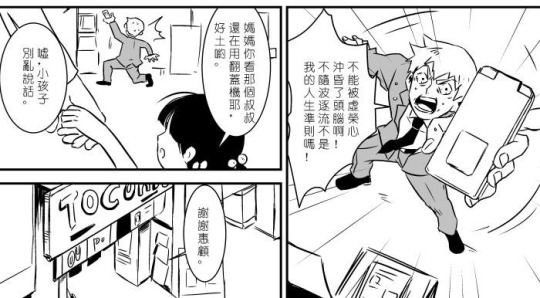
Reigen: I can’t get carried away by vanity. I don’t blindly mirror the choices of others, that’s not who I am and how I want to live.
Little girl: Mom, that basic guy has one of those basic phones.
Mom: Shh! Not out loud! ------
Cashier: Thank you for the purchase!

-Later at Reigen’s apartment-
So this is the cutting edge of communications technology... It feels like opening a treasure chest. - as he opens the box -
WOOOOOW!!
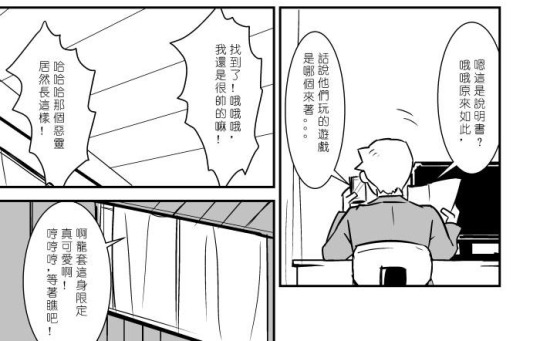
Ah! so this is the user manual. I see... I see. What was the game they were playing?
Found it! Ooooooo! My avatar looks so cool.
Hahaha found Ekubo! What a fitting avatar for an evil spirit!
Ah! Mob’s avatar is adorable. Aww he’s going to sleep now.
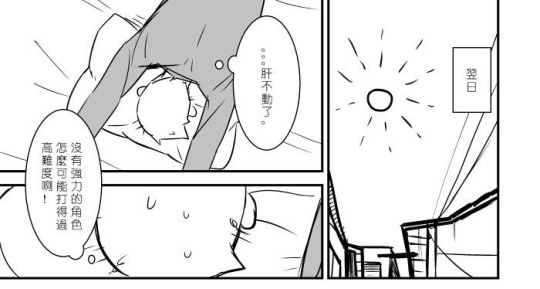
-The next morning-
Ugghghhhh can’t keep grinding....
You can’t get past any of the bosses without seriously strong upgrades.

-Gets up stiffly-
Okay time to spin for the powerup bonus.
-He taps to draw a new powerup.-
.....................

NO RARES, ARE YOU KIDDING ME?!?!
-throws phone- -nervously catches it again-
No gems left, no gold left.... is making an in game purchase the only way to get more draws?
No wait Arataka, it’s just an app game... be reasonable!

Calm down... think about this...
-LIMITED TIME ONLY! 100% CHANCE OF RARE ITEM-
Reigen taps “buy” and there is a cash register sound effect.
As the scene zooms out, the sound effect rings several more times. (ie, he makes a bunch more in-app purchases)

Mob: Master’s been working really hard recently. He didn’t even take a lunch break today.
Serizawa: Did something happen?

GODDAMMMMIT I maxed out my funds on in-app purchases. Have to take on more jobs to make up for it.

--For the first time in his life, Reigen Arataka realized the terrifying allure of escapism.--
I’m switching back to my flip phone.
By Tamadango
.
.
This is one of my absolute favorite comics. It’s got everything I love about ALL of the characters.
- The spirits and such team just hanging out around the office, not doing any work, just casually sharing something they all enjoy.
- Ekubo having to be THE BEST... Canonically he refers to himself as Ore-sama or “本大人” which is more accurately translated as “Your Majesty, I....” He is clearly better than everyone else and he needs to show it at even trivial things like a phone game.
-Ekubo possessing his host to play for hours and hours just so he can one up his FRIENDS (two of the most powerful psychics in the world)...and justify them as “followers” with “much to learn”.
- Mob is the most powerful esper in the world and can flatten cities effortlessly, The three adults treat him as an equal, and Serizawa even treats him as a superior. Yet he’s still a kid that needs boundaries. His MOM bought him the phone as a reward for good grades and takes it away at night.
- Serizawa stopped being a shut in and his GPS app is allowing him the independence to be out and about for the first time in his life. His smartphone gives him the agency to start living on his own terms, just as Reigen’s flip phone allows him to stay focused on what’s important to him.
- Reigen for all his sweaty conman disasterness is a dilligent, organized, autodidact, that started his own successful business at 25. He doesn’t play games, he’s constantly working on his business, and he understands and is proud of how offbeat and uncommon that is....but he’s not beyond moments of insecurity driven impulsiveness. It’s incredibly consistantly depicted, him being a spoilsport about the game, buying the phone, but also throwing it when he doesn’t get the in game item he wants.
- Reigen isn’t someone that does a half assed job. He gives 110% even on jobs he’s not being paid....so it makes perfect sense that he can’t seem to stop himself from becoming overly dedicated to a phone game.
-But lastly, some culture/language meta. The characters and series is japanese, the artist that drew this comic is chinese, and it’s being translated into english by an american. The little girl at the phone store says “Mom, that basic guy has one of those basic phones.” what she really says, is “Mom look that guy has a flip phone, it’s so provincial/rural.”
China has this interesting divide between the urban and rural population. Where people living in cities view people out in the countryside as dumb rednecks that are decades behind in education, technology, social norms...etc. This is not true, but saying that someone is from the countryside is a massive insult. No one wants to be seen that way.
English lacks this divide between urban vs rural, and the only word that fits even a little is “basic.”
So even if this is a fanart for a japanese series, the context of that line can really only be understood in chinese, and there’s no word that really comes close to that idea in english. From a translation standpoint I find that really interesting, when media hops countries it loses, but also gains things.
God I love this comic so much
187 notes
·
View notes
Text
The Origin of Worldview
So this is going to be a semi-personal, but also a semi-explanation post about alot of the background info regarding Worldview. Yes it’ll be a long somewhat boring wall of text for many of you, but to ME it’s words I feel need to be said and it would mean the absolute world to me if people would take the time to hear me out. Even if its only gonna be the five of you that continue on after this. Anyway...
Worldview technically started forming in my mind when I was probably about fifteen. (For reference, at the time of writing this, I’m about half a year to thirty-one) I was really into doing comics, I had done probably a hundred pages of a really dumb fantasy comic I came up with when I was TWELVE, a Sonic fancomic, and every morning on Monday, Wednesday, and Friday, I would upload my micron inked and colored pencil story about some DnD characters into the school scanner to post on Drunkduck which is probably all still there today. Adventure’s Guild is missed in my heart, for sure. But in between looking for my first job, the constant writing and doodling I was doing, and my schoolwork I was tossing another idea around in my head. A really DUMB idea, cuz ya know I was FIFTEEN. And I wanted to call it ‘My Big Brother the Ninja’. At the time I was influence by all the dumb anime I was watching and my best friend at the time who always wore black and stood about two feet over me. I don’t know if he’ll ever read this, but trust me if he knew I was talking about this he would recognize this story right away. Well. My first job came around, along with my post secondary college work, and then a tech school I paid for, and.....life really started to get in the way of development. I was more focused on drawing Adventures Guild and other doodles for a long time, and soon enough taking care of my daughter took precedence over everything, and then I started sewing, and doing conventions....and the idea of ‘My Big Brother the Ninja’ was just stuck in the back of my head. Sitting. Waiting. Forming slowly as it waited for its existence - its time in the sun. And at some point I decided I wanted Android/Robotic like characters too...some of my FAVORITE series are Kikaider : The Animation and Chobits (the books, not the infants show they try to pass a a fully written anime) - things like that. So I KNEW long before Worldview had a proper name I would be writing robot characters with a twist. But I couldn’t figure out what that twist was, what would make it work. The whole idea was still....building. It needed a push. Right around the time My Hero Academia came around everyone with a creative mind seemed to be suddenly struck with a similar idea - what if unique powers WEREN’T so unique in a world? This is fairly common now, but at the start of MHA I remember finding it weird that suddenly every half the new shows out had a whole population of super powered badasses in a world where living daily life with it was more the norm than the exception. And I remember finding it REALLY weird this all came out the same time I evolving a similar idea for my own thing.... I wish I could prove I was evolving this ideas before I saw em but I can’t. I have a much deeper theory about the evolution of cultural art and how influences drive creative minds to similar conclusions but that’s a LONG mental dive for another day. ANYHOW.
So my original idea in ‘My Big Brother the Ninja’ was the Ninja would be the weird super power in the normal world. NOW I wanted the NINJA to be the ‘normal’ one...and the younger sister would be the WEIRD one because she DIDN’T have some sort of power or ability. I fell in love with this new dynamic and now things were REALLY starting to come together in my mind, what kind of powers were people gonna have, just HOW mundane was it gonna be, how many fantasy elements did I want to have? Because I already KNEW another element I really wanted to include was modern day Paladins - and YES I WILL be covering modern-day style Paladins in Worldview proper, but this meant the universe needed a Deity system, a hierarchy or pantheon. And the world just started to grow....but something was still MISSING, the binding, the elements of what all I wanted to do - Aaaaaaaaaand then came UNDERTALE. And yes this ENTIRE long post is just me mini ranting about how WV came to be so people can TRULY understand just HOW much is inside MY universe so we can stop tagging it as part of the UT Multiverse please and thank you - it’s not that I don’t UNDERSTAND the confusion, but here is your ultimate ‘for the record’ post regarding mine and @little-noko ‘s personal frustrations. Undertale was obviously a HUGE part of pop culture, personal experiences, my life, MANY of my readers lives, I GET why the emotional connection is there and why its the first thing that comes to mind - but the ONLY part I truly was fascinated by with Undertale was the way the Souls were. PHYSICAL Souls - an actual magical entity that represented a person - THIS idea. This was my missing piece. To say artists get inspiration from other artists is beyond an understatement - even Sans and Papyrus are references to Helvetica, right? If not references, inspired by, or ‘great minds think alike’, whatever your argument there....its not uncommon. And Souls being PHYSICAL was the element I wanted to play with - the idea I wanted to expand on, and so much more I want to go into detail about but don’t want to go into spoilers yet so I’m not going to - and the absolute CRUX of my frustrations when dealing with ‘WV is just UT with different characters’. Worldview has.....humans. Only humans, divided into four race. Mechanoid. Masic. Skeleton. Metazoan. (The last one exclusively because I wanted an excuse to draw cute cat girls, so sue me) A pantheon of Gods. It’s own world map. Special BIOLOGY that I have developed to work specifically with the races I have built. Ability trees (diagram to come, don’t worry, we’re just still working out the kinks). It’s own countries, nationalities, and even it’s own tangible form of afterlife which I blame watching WAY too much Supernatural on but HEY Reapers are freaking COOL man. It’s absolutely gut wrenching painful to have people argue with me over a world that I have nurtured and slowly tended to for a good fifteen years...now that it finally, FINALLY gets a chance to exist and be worked on....I feel like the one binding element I finally found and played with and tried to expand on is the ONLY element that people care about. As if absolutely EVERY other element that I want to show just - doesn’t EXIST. We started with Finch because its a good transition from the old projects to the new and it’s the earliest event in the timeline - nothing more than that. But I’m almost starting to feel like that was a mistake because it’s TOO familiar. There’s no going back now, and thats fine. But it does make me anxious to move on to the next ‘chapter’ we’ll be delving into. MAN. I hope that helps clarify a few things. I love answering questions (those that I can) about WV...so my ask box is always open. For those that made it, thanks for listening. :)
#alainatalks#worldview#worldview origins#long post#semi-rant#mostly annoyances I just wanted to get off my chest but I didn't want to be mean about it#its just REALLY frustrating on my end#XD#thank you#!!
128 notes
·
View notes
Note
Happy Worldbuilding Wednesday! Today I want to talk about the rules of hospitality. What is owed by a host? A guest? How long are stays usually? How common is traveling? How does this all vary along social strata?
Oh gosh this is so interesting. Thanks for the ask!!
Gonna put this under a cut as well cuz holy smokes this got long. I just love this topic, okay.
So, in both Leinos and Azeria, hospitality is a really important tradition, and it’s part of why the peace treaty worked so well when the Wandering Kings and the rest of the Leinai first fled to the Azerian continent.
•••
For the Leinai, the host usually is supposed to fully and generously provide for any guest, but especially lone travelers. The person taking sanctuary in your home always eats first and best, and has a lot of privileges. All of this based on the fact that you don’t know how tough the road has been, so it’s always better to comfort more rather than less.
Further, a host usually does not ask questions of a guest unless the guest asks questions first. There’s a expected balance there. (This also is a handy cultural loophole that fugitives love exploiting.) The only exception to this is that a guest should always know the name or a name of the person/family/house/etc that sheltered them. In ancient times, this was to honor their contribution in whatever saga was recorded about the journey, but that mainly applied to traveling royalty and heroes, then diffused to the point where everyone does it now.
Usually, unless the person is very personally close with the hosts or the visit was planned, stays only ever last until the next day, when the guest is expected to continue their journey.
Traveling is pretty common among the Leinai, obviously, but obviously more agrarian communities and others that are usually more stationary out of necessity will tend to be hosts more often than travelers. In the past, wealthier folk like local monarchs made habits of routinely going on long journeys to visit far corners of their lands, slay monsters, parade around, and generally increase their reputation. This lead to the formation of a whole network of traveling regents called the Wandering Kings, which I mentioned earlier.
•••
Now, Azeria has similar cultural values in this specific department, but some really different rules & origins for it all.
Basically, Azerian society is broken up into two halves: the population of the cities and villages, and the nomadic populations. Despite this dichotomy, they are integrated together into one nation through shared cultural practices/beliefs/etc, one of the most important being their hospitality rules.
First of all, for hosts: it’s imperative that you be generous and welcoming, as with hosting in most cultures. You should share anything your guest may not have of their own if you do have it. Further, if a nomadic group is visiting your village or city, everyone is expected to help welcome them for their stay. Stays from strangers are often much more extended in Azeria as well, as sometimes you will have multiple groups staying somewhere for whole seasons at a time.
This idea of welcoming is even built into Azerian homes, as the first room in any house is specifically designed for welcoming guests, sharing meals, and socializing. Speaking of sharing things, it’s also customary to trade names between host and guest. By sharing your name, it’s essentially a promise to speak truthfully and respect your host/guest (because your name can get cursed now if you don’t).
But in Azeria, the rules of being a guest are even more important. Because they were such avid explorers (before the tragedy that cut them off from the sea), they had a code of respect that they enacted anytime they visited a new land or people, and it was based on their own rules of intercultural guest relationships back home. For example, you always ask for consent before you do something in another’s home (within reason, of course). There’s a thousand of these traditions that include things like seating placements and just... a bunch of stuff. Most of which just boil down to “respect the other party’s home and the fact that it is theirs, and accept their terms when in it.” One thing other thing they do often do is bring or create symbols of peace. On a personal scale, this could mean a small carving that the hosts would then place somewhere in their meeting-room. On a cultural/national scale, perhaps they might bring gifts of gold or ships or etc.
So, as evidenced by the nomad bit, it’s safe to say travel is really common in Azeria. Even among village/city dwelling Azerians, there’s set times during the year specifically for visiting whatever tribe or tribes your heritage is from, so pilgrimages are made often. This holiday/time of the years goes for royalty as well, which leads to an important aspect of guesting/hosting specifically between settled vs nomadic Azerians: as a nomad, everyone is equal. You’re defined by your experience, skill, age, that sort of thing, but the fact that you’re the king means little when you’re all just living off the land. This sort of “just another tribesman until proven worthy of other recognition” attitude is common when city folk guest among their nomadic fellows. It’s not hostile in any way, just very neutral (and therefore humbling). And even then, specific traditions still vary from tribe to tribe and even sometimes city to city.
Gods, I could go into so much about the nomadic/sedentary dichotomy, but I’ll quit rambling for now. So yeah, hospitality! I think it’s neat. Happy wbw!
#not story#worldbuilding#wbw#wbw asks#Leinos#Azeria#thanks so much for the ask I had a bunch of fun :]#long post#a day late but that’s just cuz I got so excited
4 notes
·
View notes
Text
StarPre Ep 29: Planet Saaman, the Frontier (??)
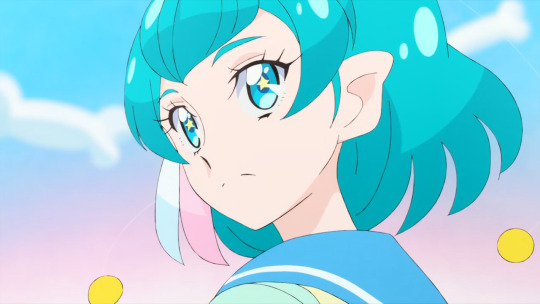
Alternatively, “YEARSH, MOAR LALA!!”
Sooooo many things to discuss about this episode (yay!) as I expected as much with going back to Lala’s homeland.
Therefore, I should go through everything efficiently (ahahaha~).
*cracks knuckles* Let’s begin!
1) Saaman, a world ruled by AI + Lala, the anomaly
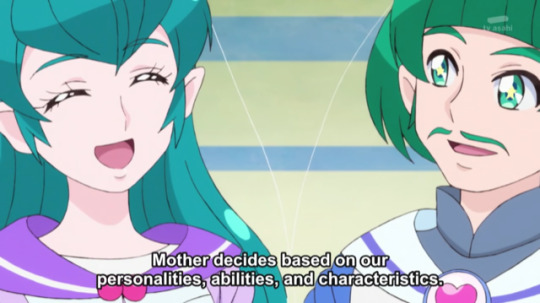
I believe by now, most of us have consumed enough media to understand that a utopia run completely by a computer is NOT the ideal world it paints itself to be.
While there are certain perks in efficiency, the lack of freedom, authenticity and most importantly, the limit on a person’s individuality and true potential (among many other things) are so alarmingly concerning that such a reality is not worth it.
However, Saaman is just that. Its citizens not only thrive on their reliance of the AI, they are also super (!!) content with a machine deciding every single aspect of how they live.
Which suggests that Saaman’s current social infrastructure and foundation must have lasted quite long already (probably centuries) for the entire population to rarely, if ever, question the decisions that AI “Mother” made for them.
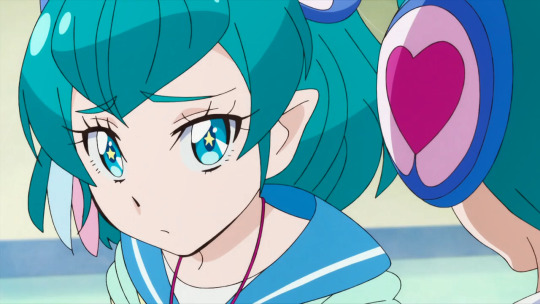
Save for one. Our lovely Lala-chan.
I mean, can you blame her for not going along with the norm like her family and fellow Saamanians do?
AI Mother’s evaluation of her determined that she was most suited to investigate garbage.
After everything we’ve seen her done, how much she’s experienced and grown on this journey, of course, she can never be satisfied with that!
Lala deserves SO👏MUCH👏 FRIGGIN’👏MORE👏 (give her the galaxy!) than to sit hours upon hours sorting through junk!
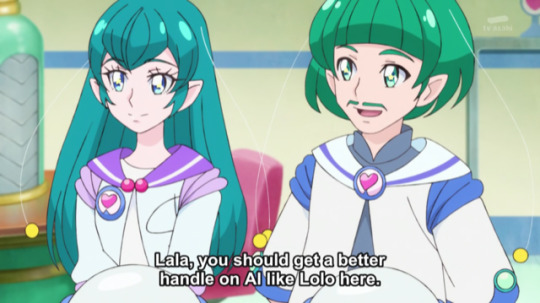
Unfortunately, given the longstanding situation and culture of her planet (again, a reminder that the people of Saaman have no problem with this lifestyle), it would be incredibly difficult for anyone to actually voice their opinions of disagreement with Mother’s decisions.
Especially Lala, whose parents are big shots in Saaman and older brother is the poster child/epitome of Saamanian values.
When the majority of your family is so ensconced in societal conventions, it’s not surprising that they would push the “lesser” relative to be more like “everybody else”.

Please don’t make the mistake that this means they don’t love and care about Lala because it doesn’t. It’s so obvious that they worry for her and only want the best for her.
BUT! It’s also obvious that they don’t really know Lala nor can they be considered close to her (she calls her parents by their given names instead of simply “Mom” or “Dad”, for stars’ sake!).
Lala’s family doesn’t understand her or her unhappiness with her assigned role on Saaman. They’re so content with their own jobs that they fail to see anyone else can feel differently about theirs. So the only solution they can think of to “help” Lala is to push her further into it, believing that eventually she’ll become content.
It’s something that happens to a lot of people and perhaps the reason why Lala left Saaman in the first place. She couldn’t exactly rebel so she ran away from the pressure on her spaceship. Maybe she didn’t intend to be away for an extended period of time but still, she left hoping to search for something that Saaman could not, would not, give her.
Then she fatefully bumped into Prunce and Fuwa running away from the Notrayders, met Hikaru, became Precure and the rest was history (or rather, destiny~).
At least, that’s how I see it.
2) Madoka relates
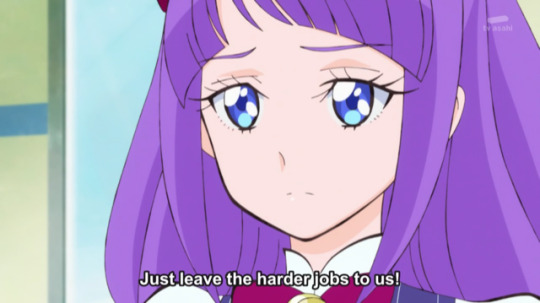
Y’know, at first, I thought Madoka empathizing with Lala’s discomfort was based on their similar upbringings.
Despite how close Lala and Hikaru are with each other, it’s Lala and Madoka who have the most in common out of all the other members of their team and I’ve been waiting for the writers to touch on that for some time now.
From birth or early childhood at the very least, everything was already decided for them. What they will be when they grow up, what their routines will be every single day, what expectations they’re supposed to fulfill, etc.
It’s a suffocating position that doesn’t leave a lot of room for argument and what shaped these two girls into having very detrimental perfectionist outlooks before that changed after meeting Hikaru and becoming Precure.
And now that Lala finds herself under stucky circumstances with her family, unable to enjoy the same openness with them as she does with her friends, I thought Madoka was going to try to encourage Lala not to let that get to her. She’s going through the same thing with her own father, after all, so if anyone can tell Lala’s going through a hard time, it’d be Madoka.


But turns out, that’s not quite the case here as the issue lies with them keeping their Precure identities and duties secret from their families instead.
Which is fine because at least Lala still has someone who can understand her on that.
Anyways, it’s a problem because being the upstanding, honest and serious types they are (majimeko) and both coming from families with high reputations, it’s really difficult for Lala and Madoka to not tell the people who are important to them about another part of their lives that is very important to them.
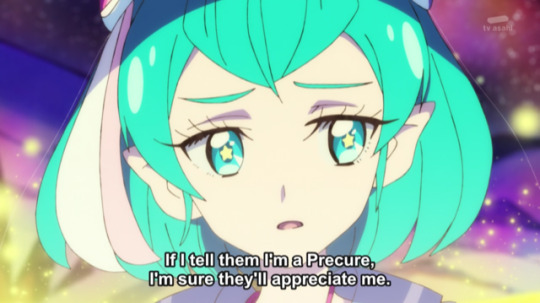
For Madoka, she feels that she’s betraying her father by hiding the fact that her friends, the very first and truest friends she’s ever made, are either aliens or helping the aliens avoid being caught.
For Lala, she’s torn between her duties as a Saamanian and wanting the acknowledgement of her family and community against the desire the protect her friends from the consequences of acting on the former.
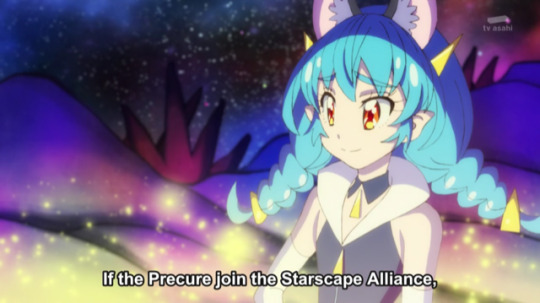
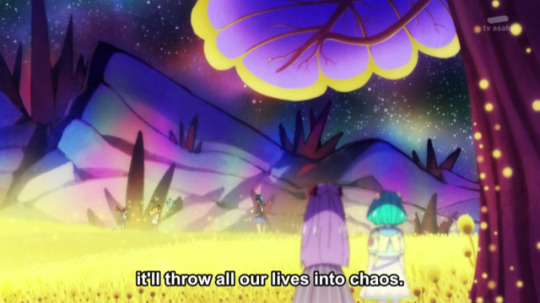
And they are right when they suspect things would probably be worst off if they were to reveal that they are Precure.
Sure, they can probably expect to receive some more substantial support from the officials of their home planet (more from the Starscape Alliance than Earth’s government, sorry Madoka)...but at what cost?
The Star team can operate and travel smoothly throughout space precisely because nobody else is aware of who they really are. If they reveal their identities, there’s no doubt they will be targeted to be controlled.
Because sadly and not to get too political or anything, that’s just what governments do. They have to control the situation, they have to think about the interests of their own countries and more often than not, they extremely suck at it and turn everything into a huge mess (and this is just massively simplifying the general for length).
If they let other people get involved, the team’s balance and even their friendship will likely absolutely be affected and strained because no way will the universe at large care about a bunch of girls getting along as much as they do about using them for its own needs.
Which I’ll get more into on Point #3 below.
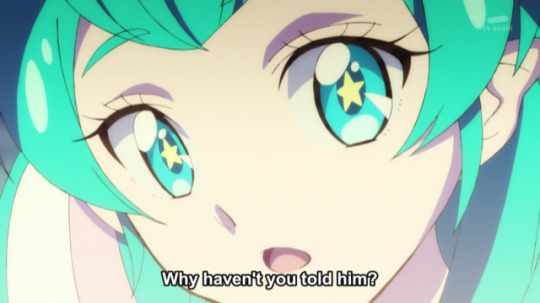
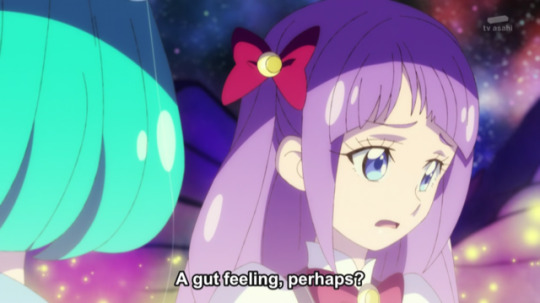
But for certain, that’s one of the reasons why Lala and Madoka are unable to tell their families about being Precure.
Yes, it makes them very uncomfortable to keep this huge secret...a secret.
But at the same time, it feels even more wrong to expose it because once that happens, nothing will be the same. Nothing can stay the same.
Even if they avoid all the worse case scenarios, the ones who will definitely suffer the most will still be the girls.
Perhaps that sounds selfish because they’re putting their friends above everything else but it’s not like the Star team isn’t also doing their best to keep the villains at bay while trying to save the universe at the same time. And they’re already doing an exceptional job without anyone breathing down their necks about it.
*cough* Sorry, getting off track a bit.
Anyways, the point is, they’re following their instincts this time which is a BIG deal for people like Lala and Madoka who have tendency to lean more towards logic.
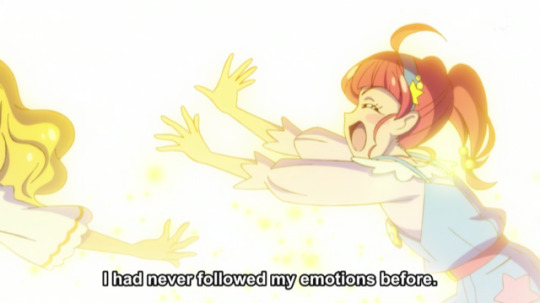
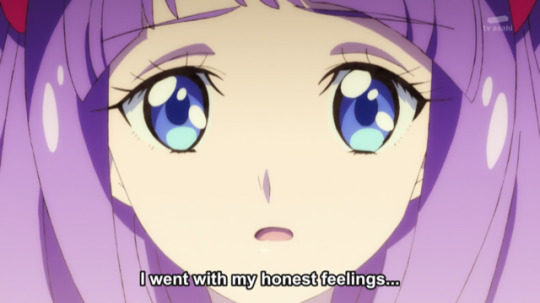
After meeting Hikaru, after letting Hikaru teach them about valuable things they didn’t know before, both Lala and Madoka learned that there is much more to the world than the structures built around them.
Sometimes, the right answer doesn’t lie in the data or the rules, cold and fair in judgement.
Sometimes, simply trusting what you feel is just more correct.
Nobody ever said doing the right thing will be easy (in fact, many times, it never is) but the heart can never lie to you after all. And it’s even more dangerous to ignore it and live through the regrets afterwards.
So which would you choose?
Going with what you feel and doing everything you can to get the best outcome? Or choosing the opposite, knowing that doing so, the best outcome becomes more impossible to achieve and you can only hope for the best of the worse?
Eh..my phrasing isn’t very good but you get what I mean, right?


Anyways, it’s just very meaningful for Madoka to be the one to say these words to Lala.
I wouldn’t say she and Lala have completed their personal journeys yet (we still have like 20 more episodes to go after all) but I do believe that this particular moment marks a very significant point in their arcs.
Having been exposed to more of the world out there beyond their own, they would never go back to being the same Lala and Madoka from the beginning.
They are still unsure about whether their choices will lead them to what they’re looking for but they both know there’s no point in looking back. They can only move forward, trusting in what they feel as right.
Which it will be and not just because this is Precure but because it will leave a very bad taste in my mouth if I wrote all that and the right doesn’t end up prevailing. :P
3) The next step...

I’ll give you a straight up “NOPE!” to that, Pops!
Apologies for letting some of my RL views seep into this post (though can you blame me when it’s been disaster after disaster out there?) but I’m positive that “joining” the Starscape Alliance (their terms, not Precure’s), no matter how well-intentioned they are, will hurt the Star team more than benefit them.
Again, cuz it will allow busybodies to unnecessarily butt into their affairs and make things harder for the girls than they already are.
Moreover...

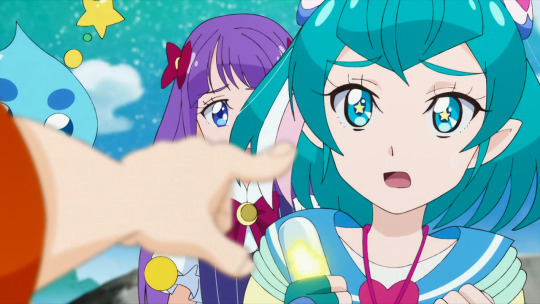
This is just Lala’s boss being an incompetent ass-for-brains idiot but if the Starscape Alliance is anything like him or even thinks remotely like him, then the Star team coming under their control spells doom for all.
Seriously, this is another level of messed up stupid. They just got terrorized by a flamboyant tengu woman and the person he accuses of trying to steal the Princess pen is Lala?! Even though the wrecked video footage is NOT enough sufficient evidence to point her as an accomplice to Tenjou? Even though Lala’s safely holding onto the pen in the aftermath, is noticeably NOT running away with it and showing concern for her boss?
WHAT THE SERIOUS FUCKING FUCK?!?!
D:<
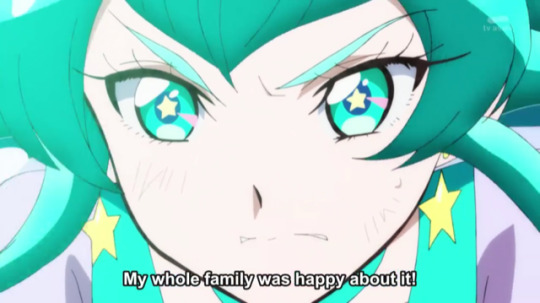
That said, I hope that in midst of all the chaos of next week’s episode, Lala’s family will at least refuse to believe Lala is a thief and try to find a way to talk to her to know what’s really going on.
Because if they can’t even do that and join the chase to jail their own daughter, then I have another concern to worry about and will immediately fly to Saaman, lay waste to it, take Lala home with me and file to adopt her as my own child (don’t laugh).
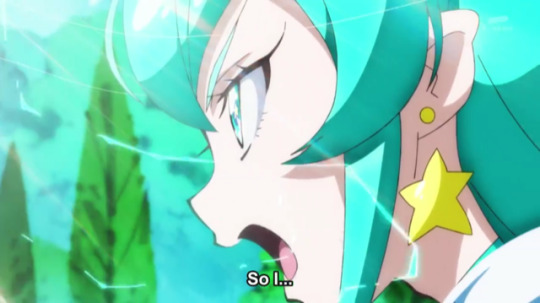

But seeing how Lala fought so hard, despite her awkward relationship with her family, to make sure Lolo’s efforts weren’t for nothing, I’m sure it’ll be alright.
Having both her parents and Lolo come to understand Lala would be ideal...but if not, then either one or the other. I’m banking on Lolo atm since he’s her twin but he can be the type who chooses the system over his own kin, too, so...
The screentime we were given just wasn’t enough for me to grasp where each of Lala’s family members stand on their respective relations with her so I can only hope for the best. :/
Ooo, and also, Cancer Star Princess gets revived next week! Yay~! :D
63 notes
·
View notes
Text
ZIGGY ✰ STARDUST

i jacked this from @cardinalrot. thank you dad. tagging: @gothsic ; @blossomingbeelzebug ; @betelguide ; @thatcertainnight ; @prophesyed ; you, specifically, reading this.
𝐛𝐚𝐬𝐢𝐜𝐬
FULL NAME. [ redacted ] * NICKNAME. ziggy GENDER. agender (he/him or they/them) / typically presents as a “man” for simplicity’s sake and also because he doesn’t care enough to think about it for more than 4 seconds HEIGHT. 5′10″ AGE. 26 (earth years) ZODIAC. ??? (he wasn’t born under our stars ... so .......) SPOKEN LANGUAGES. any/all (he doesn’t really know them, though, he uses an internal translator)
𝐩𝐡𝐲𝐬𝐢𝐜𝐚𝐥 𝐜𝐡𝐚𝐫𝐚𝐜𝐭𝐞𝐫𝐢𝐬𝐭𝐢𝐜𝐬
HAIR COLOR. bright red, seemingly unnatural -- but it’s natural EYE COLOR. left pale blue, right black SKIN TONE. very, very, very pale BODY TYPE. skinny. very skinny/slender/svelte. willowy and tall and bony. good for looking waifish on magazine covers but bad for lifting even vaguely heavy objects. VOICE. posh, nasally, low, the slightest bit condescending. speaks with an english accent despite not being english, let alone human. drawls his vowels and enunciates his letters. his voice is strangely clear and bright when he sings, unlike his somewhat unpleasant speaking tone, and he tends to sing in higher pitches than his speaking voice. DOMINANT HAND. ambidextrous -- but he can only play the guitar left handed POSTURE. very straight and proper, holds his head high and his shoulders square. uncertain if it’s height alone or if he really is looking down upon you. SCARS. small incision in the back of his neck where the translator was placed. barely there and usually covered by a collar or his hair, anyways. TATTOOS. none BIRTHMARKS. a large yellow disc on his forehead, rimmed with a slightly darker yellow/bronze with the slightest hint of a chromatic shift affect due to reflecting/light catching pigment in skin cells. this isn’t unique to him, however, as every member of his race has it. has the tiniest hint of a freckle above his lip, on the left side, and he hates it and wishes he could nuke it off his face. both of these are usually covered, anyways. MOST NOTICEABLE FEATURE(S). the circular mark, his unusual eyes, his sharp features, his bright hair. everything about him is weird and outlandish and strange, but it helps him maintain a striking, marketable image.
𝐜𝐡𝐢𝐥𝐝𝐡𝐨𝐨𝐝
PLACE OF BIRTH. far away. HOMETOWN. faaaaaaaaaaaaaaaaaaaaaaaar away. SIBLINGS. [ grabs the steering wheel and veers straight into worldbuilding headcanon territory ] the society he comes from is no longer sexually dimorphic and typically doesn’t reproduce the natural way. having evolved far beyond such icky things, they use genetic samples from large swaths of the population to make consistent batches of new individuals -- the genetic samples are screened for defects and aberrations and sort of tossed together into a genome salad, and out comes however many individuals they need to fill in gaps in the population. there’s a lot of consistency in his species due to this: everyone has reddish hair, everyone has heterochromia, everyone is about the same height, etc. so technically, he’s related to everyone in his “batch.” PARENTS. he wouldn’t ever know -- a lot of people, probably
𝐚𝐝𝐮𝐥𝐭 𝐥𝐢𝐟𝐞
OCCUPATION. rockstar -- cultural icon -- celebrity -- musician -- singer -- model -- jerk CURRENT RESIDENCE. london, LA, NYC, but he’s constantly moving and tours quite often CLOSE FRIENDS. few and far in between -- he’s friends with his drummer who is named priscilla but usually goes by the stage name WEIRD, as well as siddharth, his bassist, who goes by sid in his personal life but GILLY on stage. they were the first two humans to encounter him and taught him everything he knows, from how to tie his shoes (aliens wear boots, and you should know this) to the C major scale -- because they are among the few humans who know his secret, he views them as his closest and dearest friends. his stardom isolates him from them, just a little -- he likes the spotlight but they don’t mind just being “the drummer” and “the bassist.” they don’t quite have the star power that he does. his manager -- tama ahinariki, some guy from new zealand who seemed to bumble his way into becoming in charge of one of the most successful musicians of the decade -- also knows he’s an alien, but they tend to be more business partners than close friends. tama is more interested in the money side of things whereas priscilla and sid are only interested in the music. ziggy has stock in the music, money, and his personal brand.
via rp, he’s made some friends with other characters! a few. very few. RELATIONSHIP STATUS. single -- he intends to stay that way. he gets all the action he could ever need from his legion of devoted fans and groupies. even in situations where he’s romantically involved and emotionally invested, he would never consider himself exclusive or monogamous. a lot of tabloids make rumors that he’s involved with cardinal copia, fellow rock icon, but he tends to be sneaky at hiding any time they spent together. it’s hard to keep things private when you’re both massively popular public figures, though. he goes out of his way to be sure no one knows about his predilection for spending time with thomas, because the last thing an awkward alien in disguise needs is a lot of public attention because people think you’re dating a celebrity (who they don’t know is also an alien). he hangs around annie a lot, too, but this is extra extra under wraps, because annie has a stalker named jonathan who may or may not go apeshit and try to tear his head off or something if he finds out. FINANCIAL STATUS. filthy rich. should be guillotined. DRIVER’S LICENSE. doesn’t have one. he has some paperwork, somewhere, with a “real” name and all that, but he has no idea where it is and lets his manager deal with that stuff. CRIMINAL RECORD. none ! clean slate. that doesn’t mean he doesn’t do illegal things, though. he just doesn’t get caught. VICES. smoking, drinking, la cocaina, sex, impulsive spendng, rockstar stuff.
𝐬𝐞𝐱 & 𝐫𝐨𝐦𝐚𝐧𝐜𝐞
SEXUAL ORIENTATION. bisexual. PREFERRED SEXUAL ROLE. submissive | dominant | switch | top | bottom | verse. this doesn’t really come up in rp because i dont write nsfw. the way i view it is that he’s lazy and would rather you take care of him than the other way around LIBIDO. pretty high, but it’s difficult for him to have as much sex as he might prefer because, uh, he has, uh, alien..............parts...........and stuff ..... like ....... some parts down there look different ....... so he’s stuck having sex with usually in the dark, under sheets, and he has to zip his pants up really quick afterwards. maybe it’s a little bit hilarious and i just think it’s funny idk LOVE LANGUAGE. selflessness (which is big, for him, king of all douchebags and lord selfish dickhead the third), rambling to you about his day, physical affection, gifts, letting you see him without make up, opening up to you about his life before earth. he might play you music, sing to you or write you songs if he’s feeling particularly sappy. this is stuff reserved for people that he finds himself incredibly romantically/emotionally attached to, though, not the people he has one night stands with. and he almost never forms any sort of lasting attachment to the people he sleeps with casually. RELATIONSHIP TENDENCIES. he tends to fall for people who challenge him in some way, who aren’t easily beguiled by his status and physical looks, but who aren’t outright mean to him. that being said, he is very vain, and he loves being showered in compliments, praise or attention. he matches well with people who can put up with his antics and moodiness and odd behavior. he likes the idea of being someone’s muse or someone’s idol, so he finds himself drawn to other creative types. he has the most intimate/special connections with other nonhuman beings, especially other aliens, cuz he feels like they Get him and he wouldn’t be really giving himself in his fullest form if he had to still play pretend that he was a human being. for whatever reason he goes apeshit for goth guys/dudes with black hair who wear a lot of black. he really doesn’t like people who are too much like him, because HE’S HIM, and you’re YOU, and he really wants it to stay that way. GET OUT OF MY DRESSING ROOM
𝐦𝐢𝐬𝐜𝐞𝐥𝐥𝐚𝐧𝐞𝐨𝐮𝐬
CHARACTER’S THEME SONG. there’s a whole album about him .......... theres a song called “ziggy stardust” ....... HOBBIES TO PASS TIME. singing, music, writing -- he lives for that shid. he likes art in all forms, so he reads, watches movies, looks at paintings -- he has a lot of human culture to catch up on, and he loves all of it, from any time period and any culture. he also likes buying things, shopping, looking nice, gossip. he tends to be a party animal (party alien?) and often indulges in more hedonistic fun. LEFT OR RIGHT BRAINED. his brain is not structured like a human brain. also, head empty. no thoughts. FEARS. being perceived as ugly or untalented, being outed as an alien, being rejected for being an alien, becoming a nobody, losing his social status, becoming a conformist, becoming “outdated” or “uncool” SELF CONFIDENCE LEVEL. somehow sky high and on the floor at the same time. he usually thinks he can do anything and he’s pretty perfect, but that may just be from a solid few years of repeating that to himself and empty praise given by people who are just crazy obsessed with him -- he built his confidence level on a very shaky foundation, so it’s easy to start making him doubt himself and panic if you know what to criticize him on VULNERABILITIES. a lot of things, and im sick of typing
* pay me 100000 USD to unlock my LEVEL 20 ZIGGY STARDUST LORE pack now with NAMING/TITLE INFORMATION, HOME PLANET CLIMATE/WEATHER PATTERNS and PAST OCCUPATION/EDUCATION information. includes a piece of gum i found on the floor.
#ooc#meme#I'm so close 2 being done with finals just like one more week i turn in terrible project after terrible project#i am typing this as i wait for a group member to send me the first five pages of our cumulative 10 page essay. i hate him. i hate him.#why is he taking so long. i need to write this thing.#but after that i will go back to what i need to do ...#i run this account like a shitty ship careening into rocks#but i will go down with it !!!!!!!!!!!!!!!!!!!!!!#KEEP YOUR 'LECTRIC EYE ON ME ; queue
14 notes
·
View notes
Text
Charlastor Roleplay Ideas
●theres no hotel in this one for simplicity's sake but the premise is a slow burn Charlastor rp. A horror romance could be fun because let's be honest, this is Alastor we are talking about this wouldn't be all fun and rainbows cuz um here's a psychopath, sociopath, and Chaos maker so I can just see a lot of manipulation, maybe some darker themes and so on at the beginning of their relationship but it turns into genuine love on his end as she really genuinely loves him, even with all the shit he's put her through and her friends and parents trying to separate them and a part of me wants to think that he wants to use her naivete to twist her to his side and maybe ideals so when he takes the throne of hell she would defend him and as the plot progresses he wants to still take over hell but take her as his queen instead because what better way to the throne then through marriage and him eventually falling for her without him even realizing it. The settings would be set in high society areas like manors, parties, galas, and so on.
●an Au where Alastor is still a human at the height of his career both in radio hosting and Murder Spress. That a new neighbor moves in next door to him being one and only mysterious Charlie, who for her birthday her parents granted her wish of seeing the mortal plains of the living realm and gave her a couple of years to stay there. Albeit their true motivations are to hopefully make their daughter disgusted by humanity thus being a more suitable heir to the throne of hell.
So she's greeted by Alastor as a welcoming to the sparsely populated neighborhood in the outskirts of New Orleans. And how she acts and so on fascinates him since shes not used to human culture or the social norms of the time period, and this fascination becomes obsession because theres something different about her. Plus she fits his victim criteria, make that whatever you will. And in turn shes intrigued by this human that has such an innate darkness within him that as a demon. Sunshine and rainbows or not shes drawn to him and his negativity, and so it become a psychological tango between the two. Until she either reveals her true self to him via about to be murdered or as a show of sheer trust. Or she could just vanish one day and once he dies he meets her again in hell, and the plot coninues on in hell.
11 notes
·
View notes
Note
My fantasy race is so magically powerful, they can mate with other races regardless of gender (cuz magic and reasons). The males are fertile but it's kept largely a secret because some of the other races are still ignorant/conservative/fearful. They choose mates based largely on harmonics between aura and soul energy via touch or close proximity, even scent. Should I be concerned this is complicated/wrong in some fashion or requires tweaking? Will trad gender roles be too much of a problem?
I’m going to admit that this question makes me intensely uncomfortable and incredibly confused, but I’ll do my best.
To start with, I’m confused about whether you mean races or species? Races are of the same species, and there’s honestly nothing keeping races from having relationships except cultural expectations. If you really do mean races, then “the males are fertile” makes even less sense and I’m not sure what you’re trying to say with that. I get a lot of Zeus vibes from this, who was well known to Have Relations with whomever he damn well pleased whether they wanted to or not. We do not need another Zeus in literature, let alone a species of Zeuses. Please make sure your species are still being consensual in whatever relationships they’re entering into.
I think your first step is to take a look at gender and physicality, and come to a deeper understanding of what you mean. Gender has nothing to do with the ability to copulate. Gender is a self-identifier. Humans here on Earth have made a pretty poor decision to attempt to tie a self-identifier to physical attributes, but gender is much more than whether two individuals are physically capable of having sex. So “they can mate with other races regardless of gender” isn’t an appropriate way to say that their magic enables them to ignore the physical barriers that might otherwise prevent inter-species relationships.
I honestly have no idea what “the males are fertile” means. Both ovaries and testes are capable of being fertile or sterile in our Earth human species, so “the males are fertile” literally doesn’t mean anything for me to be able to tackle. Does this mean it’s the males who bear the children? Or are males the only ones who are able to mate with other species? Why? What is it about them that makes that possible or impossible? I just don’t understand what “the males are fertile” means. (If the answer is literally just “because magic and reasons,” that’s not good enough, in my opinion. Why? Why did evolution shape things this way? How does it benefit the species to function in this way? Why not females, agender, non-binary, and other individuals? Figure it out. It’s got to be a better reason that “because reasons.”)
I’m not sure how another species would be able to remain “ignorant” in these kinds of things when there are literally individuals from another species? race? coming to mate with them. That kind of an event doesn’t stay quiet long, male or otherwise. Whether it’s believed to have happened or considered acceptable is a different matter, but “ignorant” isn’t likely possible.
Also, if inter-species/racial children are a thing in your world, I hope you’ve figured out what that looks like, how that happens genetically if you’re actually talking species, how each culture raises an inter-species/racial child, etc., etc. There’s a lot of baggage that comes with this kind of thing that I’m not sure if you’ve tackled in your world–building.
Finally, the crux of the question: Will traditional gender roles be too much of a problem?
Short answer: yes.
Gender roles are created within a culture, not within a species. (For example, the gender roles for the US are different than the gender roles for other places. There are no universal gender roles for humans as a group.)
Gender roles are guided by the values of a culture and what they consider important. The original ideas for “traditional” gender roles that you reference are based on ancient life and not at all on modern gender roles. Yes, some folks still abide by those “traditions,” because modern Western culture has skewed what make sense for ancient culture to do through a patriarchal lens and presented it as what is “good, right, and The Way It’s Always Been Done” for men and women.
But there’s no particular benefit for us to continue to do so with the way life has changed since those “traditional” gender roles were created, and when looked at as a form of species-preservation and efficiency, it probably doesn’t make sense for your race/species either.
The “traditional” gender roles you mention stem from hunter-gathering cultures that were small and whose continued population is important. The “women stay at home” idea comes from when the women were revered as life-givers and integral to the bearing of children. Men weren’t as important–any man would do–but a womb was critical and stuck closer to “home” or went out in groups to avoid the death of someone who could bring another person into the world. It persists today because conservative Western culture says that “that’s the way life’s always been and a woman’s domain is the house.” That idea is unnecessary once a culture grows out of the population problem, but modern Western culture hasn’t shed that stigma.
Another typical “traditional” gender role is that men should be doing all the labor-intensive work. Again, this is a misconception of what peoples living in bands were trying to do. It was common for men to do the hunting (read in Modern: the “big strong work”) and women to do the gathering not because women weren’t physically strong enough to do the hunting but because the women were to be protected as life-givers. They were also often more flexible than the men and did a better job of finding and reaching the best foods for gathering. The modern interpretation uses the sexual dimorphism of the human species at face value and implies that women are weaker than men. Again, this entire principle of men=physical labor and women=lighter work becomes entirely unnecessary when a culture doesn’t need to worry about population size and is able to acquire their food in excess from additional resources such as agriculture and trade. At that point, it has nothing to do with physicality anymore.
My point is this: “Traditional” gender roles aren’t a useful framework for cultures that have developed subsistence methods that are more intensive than bands and hunting-and-gathering.
To do your cultures more justice than simply overlaying our Earth values on your alien species, you ought take the time to build the gender roles according to the cultural values of the races you’re creating. Is there a legitimate reason that they would value these roles given to these genders? Is there a reason another gender couldn’t do something that our “traditional” gender roles dictates as belonging to a specific gender? How does keeping to these roles serve your story?
Good luck! -Pear
#pear responds#night of asking#posts by pear#writing#writing tips#culture building#cultural anthropology#alina774
14 notes
·
View notes
Note
(Yeah Amanda would be grounded but mostly cuz of two things: It's brash decision making and your sister's the Szardos Royalty heiress, the Princess in fact. Awhile back, weddings for the magical royals were mostly arranged between them so marrying some random guy was a no no. After Gravemoss started his "cleansing", the families practicing the Winding Ways dwindled until only one was, by then, the guy became too powerful to be stopped by the other magical families. Marrying Sabu was unheard)
I'm not sure if all american gypsies are like zhat, but it's a huge culture clash and I don't like it... and vhat is up viz zhe florida gypsy population? Is it just zhat show ore are zhey really zhat old fashioned? I could not imagine zhe vomen in my family doing vhat zhey do in zhat show...
//for anybody unaware, I think it's like at least 95% of episodes where the women in these families are expected to stay home, clean, cook, drop out of school before highschool, and marry by the age of 20. I like to watch for the dresses and drama. My stepdad is like half american gypsy but his grandparents lived at the foot of the cliff that castle Dracule sits on, so they're transilvanian gypsies only 2 generations before him so he has no clue how american gyspies actually act, so my data points really are just... my great grandparents, this show, and Kurt's family in the comics... all of which are like 3 different kinds of gypsies... however, my great grandmother was comparable in work and personality to Margali, though I have no clue how she dressed when she was working, the only memory I have of her she was wearing a pantsuit and retired... anyways, yeah, Kurt and I have no clue if it's selective representation or a good one and it's confusing... the dresses are really pretty though
0 notes
Text
As my this ten and a half months living abroad comes to a close (month and a half left!!!) I've decided to share a few things that have really resonated with me over the course of this experience. I know, I know, I solemnly swear not to become that person who's always saying "well when I lived in Maadreed," but give me a little room for sentimentality here:
1. Never assume anything is obvious. Even in the least diverse of situations we're all coming from different cultures, education backgrounds, and life experience. And in slightly more diverse situations language gets thrown into the mix. Even people you see as your peers in every way probably don't know what you're saying 30% of the time. Just explain yourself and don't be a dick. (Unless they're being a dick about not understanding).
2. You can probably figure it out. If someone as socially inept as I am can work my way through rental contracts, exterminations, doctor's appointments, and teaching toddlers who barely speak any language with my honestly mediocre level of Spanish, you can do anything within your means and courage.
3. I know that addendum in the last one sucked, but I was in a good financial situation going into this and it's a good thing I was cuz I burned through a whole lotta savings. Capitalism is a bitch, you've got to be aware of that shit.
4. At some point you're going to figure out your priorities. It's okay if they're different than you thought they'd be. Recently I was listening to a podcast where a young author (Durga Chew-Bose) was talking about moving back to Montreal from NYC. She said she'd gotten to a place in her life where she'd realized being near her parents was important to her. And that was okay and didn't make her childish or immature. Having recently gone through a similar awakening that really resonated. I need to be closer to my family and the majority of my friends than I am right now. And while not all my family and friends are deep in the heart of Texas, the distance between Houston and St. Louis or New Orleans is definitely shorter than the one between Madrid and my entire American support system.
5. It's all about perspective. Take it from the comparatively super family oriented and homebody Spaniards: a co-worker once tried to sympathize with my homesickness by comparing it to when she worked abroad in London, a city that is closer to Madrid by plane than the city I went to college in was to Austin.
6. You're not a blog person. You're never going to be a blog person. You weren't a blog person in the states and you've tried to become one during two separate stays in Europe. Being a writer isn't the same as being a blog person. Just admit you find fictional characters more interesting than your own life and move on.
7. You're never as useless as you feel. After the election a pretty sizable group of expats that includes some of my close friends put together an organization that now runs fundraisers, teach-ins, weekly congress calling parties, and all kinds of wacky activists fun. If something can be done from Spain there's probably stuff you can manage closer to home.
8. Bedbugs are satan's minions and I couldn't be happier to moving somewhere they're relatively uncommon.
9. On the other hand I'll miss public transportation. Though not the man who managed to drag his entire karaoke machine onto the metro.
10. Nor his friend with the trombone, which has never been a good solo accompaniment to anything.
11. Actually read what's in your medicine and know the non-namebrand word for something. This is something I've been doing a lot recently, as I can't really rely on known brands, and it's honestly really informative and helpful. Yes, many things will say "compare to" on the boxes in America but it's nice to feel free from the clutches of the nestle company.
12. Decide you need to be in therapy BEFORE moving to a new country.
13. There are sooo many preservatives in American produce; Spanish fruits and veggies go bad crazy fast y'all.
14. Your life does not need to be filled with crazy activity just because you live in an exciting place. Not every weekend is a holiday (even if every third weekend is a long one because there is, in fact, a Spanish holiday).
15. There's a much smaller Mexican population in Madrid than you'd think given the large, large Latino population. This isn't really a lesson on immigration statistics so much as a statement that I miss good tacos.
16. When in doubt, spell socks.
2 notes
·
View notes
Text
.*. Caring Epidemic .*.
Adrenal Reset Diet - 1800s tuberculosis was said that it came from a improper diet or lifestyle. The guilt-trip on top of the symptoms made it all worse, and the guilt-trip was so wrong. This idea described in the first few lines of the first chapter of The Adrenal Reset Diet by Alan Christianson, of people being “too lazy” and just need to stop being lazy, has been applied to apparently TB which we know 100% it’s an actual virus, disease, to depression and to even more mysterious things like adrenal fatigue. There’s “chronic fatigue” out there, because probably enough of the population feels it, it goes beyond lazy when everyone stands their ground. I’ve not met one single lazy person. I’ve met people with excuses, people with underlying issues and I’ve been feeling as someone would describe lazy, if I’d let someone describe me, but I know how my body feels so weighed down I physically can’t get up from my bed, or from my desk at work, even. Physically. How I want to do passion/pleasure projects such as dancing or songwriting and I feel I have no energy… at all. Even to watch Netflix! Where you just sit and watch. I lie awake at various times during the night, at times feeling guilty, but it goes beyond guilt because my life purpose and goals are something people have discouraged or not encouraged at least anyway, so it’s more my sense of failure/defeat that keeps me in a high anxiety place. My thought begin to feel like clouds, intangible and illegible, and scattered everywhere through my mind and through my body; discombobulated. I make lists of what I need to do, what I want to do, what I need to do for what I want to do, what I want to do for what I need to do.. and yet I get home, leaving work motivated and excited, and I crash.. literally can’t get up off my bed.. can’t even stay in bed and be “lazy”.
I don’t know where this awareness and knowledge, or wisdom more so, has come from in me. It’s just always been in me. When a doctor would tell me their diagnosis, I always thought critically about it.. is it really what is going on. And when I feel as I’ve described above or other ways, I can tell .. “something is not right” or “something is off”… something is happening. And it’s like all the theories out there.. whether regular medical or natural medical, I dismiss and I welcome things based on an inner compass. I listen to my body; literally. I literally check in with my body in an subconscious way every time “Hei, is this what you feel? Is this what’s going on?” On the surface, people who buy into what any type of doctor, whether naturopath or regular MD, says about what they need to do or what is going on, are enviable. But not really, are they? They still have things not work out, but they might dismiss it to .. more time needs to pass for the medicine to take effect, change the medicine cuz maybe another will do better, at some point they become so used to something they in a way don’t notice it anymore, etc etc. Sometimes time is the only cure. Even in some cancers, time can be as good or better cure than chemotherapy - studies have shown, and I wish I could share the studies but I’m a terrible researcher and I don’t have the opportunity right now to find them. But in medical school, people learn this.. so ask anyone in medical school, or at least for them to research it and get back to you. The problem might be.. it’s at this point a sort of gamble. But a gamble like chemotherapy, too, when you are objective about it.
The point being of this “speech” - we easily are made as a society to dismiss something wrong with others (and at the worst point, with ourselves), due to laziness or just not trying hard enough. And when the person, or yourself, feels like you’re trying more than hard enough to the point you literally are exhausted and still trying, running on fumes, we either give in, or continue to play the shame card. The danger of thinking we know everything, or what we know is stable and fact and will never change, is very widespread and damaging and real. People who know a lot will always present there’s so much they don’t know, because the more you know, the more you realize… there’s so much humanity itself doesn’t yet know. Dismissing things either to “depression” or “laziness” is not good enough. Taking pills is not good enough as much as not doing anything about it. But the most important thing whether it’s TB, cancer, adrenal issues, depression, a freaking cold/flu - it’s to be there for one another, to stop the blame game and the shame and the name-calling and the severance/cutting ourselves from another because they are sick because guess what? Your support is the greatest catalyst to being cured or at times even the cure itself. Caring for one another is the greatest antidote or catalyst for the antidote to so much of this world. Even caring for someone who may not know they need to be cared for, or wrongful caring has taken its toll on. Find out how they need to be cared for and care for them. They’re you. We’re all one. You abandon them, you abandon yourself.
In a country like the U.S. you see the lack of caring and the increase in individuality… and how it infiltrates every aspect of living, and how much more stress, more “mysterious” diseases.. diseases not from viruses, etc, but diseases such as chronic fatigue, fibromyalgia, depression, anxiety, metabolic issues/obesity, etc… there’s a strong correlation between unhealthy individuals with a strong culture of individuality. Think of taking a killer whale away from its pod and “setting it free”.. think of any pack animal like that. They’d either not survive for long being vulnerable to predators or lacking the knowledge that was previously shared by the whole pack/dependence, or if they survive they begin having issues with their fur, skin, fins, pacing, etc depending on the animal. We are forcing ourselves and each other into separating from our pack, from our healthiest, happiest state. The pack’s job is to accept someone’s uniqueness.. that’s another thing. When you’re a pack, it’s not blind following or homogeneous thought/behavior/etc.. All your cells inside aren’t the same. Skin cells and hair cells are clearly visibly different. The pack needs to behave that way, like a body, and the individuals need to behave that way, too, as a body. We often say how people in “third-world” countries, in poor countries or poor neighborhoods or times are sometimes more fulfilled and happier.. sometimes we remember that of ourselves - it’s not the lack of resources, it’s the pack. People with strong families (a secure and loving sense of community) are healthier, happier, and actually probably less pro-crime or less criminal. It’s not the poverty. If it’s the poverty that creates crime, 80%+ of the US would be a criminal. Maybe 50% is more realistic, but that’s still… 50%. And they’re not. And same - poverty doesn’t induce happiness, either. It’s the family structure, it’s the community, the pack structure. (Community - can be family, friends, city, etc)
Whether adrenal fatigue is real or not, it’s not the point. Our bodies give us signals all the time when it’s not being optimal. Whatever that means for each person, or each time, that’s half the battle. Adrenal fatigue itself comes from stress… and all I can say is that there have been two times where I was in the state I find myself in: 1) When I returned from the UK (defeated), 2) When my most recent relationship was just not working out (defeated). It’s like a defeat with a sense of loss for words. You have all this information on what happened, what could’ve been better (of what you did, of what the outside did), even of what you could do now… but there’s a sense of exhaustive defeat where you just don’t know. Anything. And you failed. And this higher sensitivity to consequences - being hyper sure of the correctness of the next step before stepping the next step. And a sense of - I’m not being heard anyway, I’m not being seen anyway, I’m a nobody, I’m just one person in a large crowd anyway. This is different from being part of a pack in that crowd is homogeneous.. where an eyelash cell needs to be a hand skin cell; blend in. Where your function is actually taken away from you.
So.. whether it’s adrenal fatigue or something else, this is what’s going on for me and also some of what I’ve observed in the world on a large scale.
Caring, like intelligence, is where respect lies. They’re also both the sexiest. Those who dismiss that, saying it’s really about looks or it’s a front (girls especially) put on… they’re obviously trying to make excuses for not caring and not being intelligent for some reason or another. Caring and intelligence saves lives, too. Saves souls.
So what I meant by the title truly - the lack of caring is a destructive epidemic, and infusion of caring should be the epidemic going forward.
#caring#epidemic#adrenal reset diet#adrenal reset#adrenal#intelligence#individualistic#society#individualism#US#world#people#relationships#family#diet#food#depression#tuberculosis
0 notes
Text
Western #6: A Fistful of Dollars
Inevitably, there comes a time when tradition is subverted and a fresh voice throws convention out the window. For the Western genre, this came in the form of Spaghetti Westerns - Italian filmmakers who adopted the Western genre tropes in their own upstart style. A Fistful of Dollars (1964), directed by Sergio Leone and introducing Clint Eastwood in his first starring film role, was the first commercially successful Spaghetti Western and thrust Eastwood into star status. In this tale, there is no gallant hero that sides with right and defeats villainy; rather, a man plays both sides of a corrupt town in order to reap their money. The sixth film in this Western Marathon ushered in a new era of Westerns that moved beyond the Hollywood studio systems stable fare, led by a team of international filmmakers who co-opted the American West to tell their own tales.
The Man With No Name enters a town surrounded by wilderness and infested with corruption. His welcome to the town - “You will get rich here, or you’ll be killed.” The Stranger becomes determined to achieve the former and immediately proves his talent as a sharpshooter, easily killing four men from the sheriff's posse in a gunfight. He then decides to pit the town’s rival families - the scheming Rojos and the corrupt Baxters - against each other, playing each side with half-truths that create a false sense of trust, which then initiates situations that begets violence. While the family gangs focus on fighting, the Stranger searches for stolen gold and also helps an imprisoned family escape the town. Eventually, the gangs realize the game the Stranger has been playing and he is captured and tortured by the Rojos. He escapes and recovers just outside of town. The rival gangs have descended into all out warfare, with the Rojo family setting fire to the Baxter home and killing their entire family, while also capturing and torturing the Strangers only friend in the town. He returns to town, confronting the Rojo’s gang leader in a one on one shootout in the middle of town. In a race to reload empty guns, the Stranger shoots the Rojo’s leader first and finally takes his leave of the devastated town.
Spaghetti Westerns describe an offshoot branch of the Western that was produced in Italy, beginning in the mid-1960s. The new sub-genre featured international cast and crews, widescreen cinematography, and Roman Catholic iconography. The troupes of the Western, covered in this Marathon’s overview, were either exaggerated or inverted; for example, the villains are portrayed as more hyperbolic, while the heroes are transformed from the white hat sheriff in the mold of John Wayne to become black hat loners in the ground-breaking mold of Clint Eastwood. Finally, the films have a focus on ostentatious violence and nonstop action. Most of these traits were defined in the first commercially successful Spaghetti Western, A Fistful of Dollars, and then the number of productions rapidly expanded for the next ten years, finally slowing by the end of the seventies. Now, only homages to the sub-genre, such as Quentin Tarantino’s Django Unchained (2012), are produced, but the effects of breaking open the genre tropes are still felt today with modern Western storytelling and production design.
One of the first indications that the viewer is experiencing a new and different type of Western comes in an early scene, where the Stranger recognizes that he must prove his gun skills to the entire town - so he approaches the men who have taken his horse. The camera is set at Eastwood’s back, with his gun hand framed in the lower left corner and his opponents in the near distance. In an incredible display of quickness and brutality, he draws his weapon and takes down the four men in the sheriff’s posse, without an editing cut nor a hint of remorse from the hero.
It now is made clear to the audience and the town that Eastwood’s portrayal of The Man With No Name is one of an anti-hero, whose mission is to play both sides of the town against each other for the potential individual profit, blurring any sense of the traditional Western’s emphasis on morality and ethics; the viewer, however, still roots for the Stranger to win, as he does some redeeming acts and he is a hell of a lot better than the rest of the gangs in the town. For example, he reunites a family that had been torn apart by the gangs, giving them some money and enabling them to escape the frontier town with the hope for a better life. When questioned why he took this action, he response: “Cuz i knew someone like you once and there was no one there to help.” Was this his mother? Someone important from his past? The script doesn’t deign to answer, only deepening the audience’s interest in this protagonist. In addition, this anti-hero relies on cunning and improvises his way out of situations, as when he hides in a coffin to escape the town in order to recover from his wounds. This type of ingenuity and cleverness in the protagonist was a refreshing element to see in a Western flick.
Another way the film subverts the traditional Western genre tropes is in the final shootout. While a lone man does appear in the center of the town and his final showdown is against the story’s main villain, both familiar elements from the baseline genre, the film takes both to new levels. Eastwood makes a dramatic entrance, as mists from a dynamite explosion clears and reveals his presence in the street. The Stranger has used his smarts to upgrade the battle with armor and uses psychological warfare to taunt the Rojo brother into playing his game. He challenges the man to a deadly race of loading an empty gun to see who can shoot the other first. This shootout isn’t about force of numbers or watching the good guys prevail over the outlaws - this is a one on one battle of skill and daring, one that the Man With No Name easily wins. He puts his life on the line for revenge, confident in his skills, but when the other Rojo brother takes deadly aim, the Stranger’s two friends in the town come to his aid. The film seems to be making a grand message about the lone man, but he is constantly needing help from friendly faces in the town.
Perhaps because the story was written and the film produced outside of the United States, away from the institutionalized racism and sexism that is typically part of the Western genre, the film has different ways of portraying the Mexicans and women in the town. First off and very notably, the Man With No Name does not have a love interest at all; he does not pursue any of the women he comes across, he isn’t in the town looking for love nor a woman’s companionship - he is there for money and nothing else. He encounters a woman who is basically enslaved and helps to free and reunite her with her husband and young son, which is his one admirable act. He also negotiates with the sheriff’s wife, who is also Mexican, when he begins to play the two families against each other. She makes the final decisions in their tete a tete, even though her husband arrives to witness the discussions. In her final moments, after the Rojo gang has destroyed her family, her husband, and her home, she still makes an impassioned speech, defying her killers in her final moments. She is a strong, independent, and feisty woman, exceeding the stock figures usually found in Western fare.
The cast of the film is also quite diverse, and while many Hollywood studio system Westerns did cast Hispanic actors in bit parts, these actors take on more prominent positions in the story, as would be realistic on the actual frontier. The audience is not presented the Rojo family as stock villains; rather, as the Stranger is housed in their compound, their inner life and complex relationships are revealed, showing a more robust portrayal of Mexican culture than is usually displayed on screen. This advance, however, is undercut by other aspects of the film. The Rojo family refers to white people as “Americanos,” an interesting linkage between the fledgling American country and the people who populate it, with the language suggesting that the Hispanic families in the town are separated from the new country. The film also attributes significantly more violence to the Rojo family than the Baxter family; for example, when the Rojo gang steals from the US Government, an incident referred to as the “Massacre at Rio Bravo,” the filmmakers focus on the ruthlessness nature of the attack, positioning the camera behind a machine gun in order to visually capture the spray of bullets that mercilessly mows down the surprised men. This trend continues in the final showdown between the rival families, where the Rojo posse has set the Baxter’s house ablaze, and the gang rushes out of the flames, only to meet their deaths at the hands of the Rojo’s bullets. The camera frames closeups on the Rojo’s faces, displaying the laughter and glee as they shoot down their enemies, and is sustained for a significant period of time, highlighting the cruelty of the men. For a film that is more diverse in its casting and portrayal of women and minorities, it still positions brown men as overly violent towards white people.
Sergio Leone gained renown for not only breaking open standard storytelling in Westerns, but he also was a talented filmmaker. His awareness of physical space and then creative choices in camera placement elevated his films from pulp fare to sophisticated filmmaking. For example, in A Fistful of Dollars, he frequently utilized buildings, fences, and furnitures as framing devices, employing the rules of thirds, and also depth of field for multiple planes of staging and action. This type of framing is much more sophisticated than the shots in a Hollywood studio system Western.
There are so many visual setpieces that deserve highlighting, such as when the Stranger is on the run from the Rojo gang. Their leader is jumping about on a building porch, yelling for his men to disperse and find the fugitive, and, unbeknownst to him, Eastwood’s anti-hero has buried himself under that very porch to hide. Not only is this very clever storytelling, but delightful choreography from the director. Another great sequence is when the Stranger has quietly stolen back into town to rescue his friend from the Rojo’s torture. The camera follows Eastwood as he carefully climbs his way across a barn’s crossbeams, with the audio of his friend’s misery overlaying the images. Leone doesn’t abandon all Western visual tropes in the movie, as he does include scenes of horses on full on gallops racing through the desert landscape.
Not all elements of the production were top quality and some techniques that were common at the time don’t hold up well in retrospection. The opening title animations are presented in stark black and orange flat colors, horses running across the screen, and incredibly cheesy bullet sounds fire when a credit is introduced. This title sequence doesn’t quite set the viewer up for the serious and dramatic tale they are about to witness, so expectations are set far afield from the actual tone of the film. Additionally, the filming technique in Italy at the time was to not capture sound during production, but to to dub the film later with the actor’s voices. This produces a mismatch between the actors lips and the line reading, which distracts from Leone’s brilliant staging and Eastwood’s serious acting. One particular sequence where the Rojos and the Baxters are facing off at a cemetery has just awful night lighting. And finally, despite some excellent makeup on Eastwood to show how terribly he has been beaten by the Rojo gang, the movie’s design team just couldn’t quite realistically capture the essence of blood. It often looks chunky and doesn’t quite flow like the real deal. The film holds up as a classic despite these quibbles over production quality.
In order for a complete analysis of the film, one must consider the fantastic score from composer Ennio Morricone, who went on to be an influential voice in film and television music. The main theme is a rich tapestry of sounds, a coordinated cacophony of voices and instruments that conjures visions of outlaws in the dry desert. Morricone didn’t have the budget for an orchestral score, so he relied on stripped down instruments and sound effects such as whip cracks, shots firing, and voices chanting phrases such as “we can fight!” The main theme features guitar strums taken straight from the Old West that combine with the piercing flute, floating the melody over bell chimes and fluttering chirps that cascade down the scales. Morricone continued to collaborate with Leone for the rest of the Dollars trilogy, with his score for the final film (The Good, the Bad, and the Ugly) considered as the crowning achievement of the series.
Overall, this film was a welcome break from traditional Western films. The inventiveness of the writing, camera placement, and score imparted fresh life into a worn down genre, infusing it with new character archetypes and interesting stories to tell. Clint Eastwood’s film debut was a staggering performance of restraint and ruthlessness, positioning his anti-hero as far from John Wayne’s cowboy hero as possible. These aspects have placed it close to the top in the rankings of this Western Marathon and, with only two more entries to consider, we move next to Anthony Mann’s 1950 collaboration with James Stewart in Winchester ‘73.
0 notes
Text
Kamen Rider Calliope Myth 1:8
Calliope was so proud of her quip that it took her a few seconds to remember she should be checking on the student whose roommate had nearly ended up with automatic A’s for the semester. By the time she had reached the body of the Ektroma, she noticed it starting to swell up in unnerving ways, persuading her to pick up the bystander and vacate the area as quickly as possible. They had barely passed beyond the field of Pandora’s Box when the remains of the Ektroma exploded behind them, just the right distance to be out of danger, but still be aesthetically pleasing as Calliope walked cooly away, carrying the fainted student in her arms.
Calliope held the girl out to Kokonoka and Shoki as they came running forward to meet her. “Take care of her. I’ll be back.” She hurried back the way she came, heading for where Yasuda was still lying on the ground. There was no trace left of the Ektroma, but her spear was still there, gleaming in the afternoon sun. Calliope pulled it out of the ground effortlessly and, with a quick spin, removed it from physical space. Odysseus had certainly chosen his weapon wisely.
Before heading over to Hikaru, Calliope also snatched up the pen that was lying right by the spear. It looked just the same as the one she had given Hikaru back on the first day they had met. Turning it over, she saw the ink gauge was empty, and she could feel no dangerous energies eminating from it. But she was wiser this time, and she wouldn’t be handing it off to anyone else.
Kaname felt the suit dissolve around her as she reached the spot where Hikaru was lying, and when he opened his eyes, he was in the arms of a friend. General confusion quickly gave way to stinging shame as the context of their situation came back to him. Nevertheless, he was hauled to his feet by Kaname.
“Crap… I can’t believe I did that… What the hell was I thinking…”
“Shut up, Yasuda. I’m not gonna hear it.”
Hikaru immediately lapsed into silence as Kaname shifted most of his weight onto her, pulling his arm around her shoulders. She realized he had probably taken that the wrong way.
“You were being controlled by that stupid pen. Don’t go blaming yourself for shit you wouldn’t have been doing otherwise.”
“I can’t really be sure that’s true. It might have affected my mood, but… I can’t deny much of what I’ve been saying. I regret it, but… I think it just revealed how much of an awful person I am.”
Kaname groaned and stopped walking, not even bothering to brace Hikaru as he stumbled forward from the sudden change in motion.
“Oh my god. Don’t start with that. Listen, Yasuda. I already get that was all stuff from your own head. But it was the pen that twisted you all up in it and made you go out of control. It’s some kind of evil tool that feeds off of people’s insecurities. And if all of that was true, so what? So part of you is an obsessive, condescending asshole. Welcome to the club, population, like, all of Earth.”
Kaname yanked on his arm again and they started off towards the nearest building. People were starting to arrive at the scene in groups; the usually-busy area had been conspicuously clear of other people once the fight had started. Fortunately Kaname’s high-intensity glare was successful at buffering other people’s urge to offer aid, and they had a clear path towards the medical office.
“You weren’t wrong about me either. I’ve been keeping it in for awhile now, but honestly, screw this university, and going to classes, and homework, and everything to do with it. I hate almost everything about this place and a large part of me wishes I had actually never gone back after the first day. Hell, if I hadn’t even gone on the first day I wouldn’t be wrapped up in all this mess now.”
Kaname heaved the heavy door open to the building they had reached, guiding Hikaru carefully over the threshold. “But y’know what. I don’t regret it. Yeah, I’m a know-nothing dipshit who’s probably wasting a space at this school when someone like your friend should actually be here. But y’know what, tough burgers. This is the way it is now, and I have every right to hate it as much as I want to, and maybe I’ll quit tomorrow, or a week from now, or never. That’s the kind of obsessive, condescending asshole I am.”
Hikaru was trying to look at her now, but it was Kaname’s turn to avoid eye contact, as she pushed him forward a bit more solidly than was called for.
“Maybe it’s assholes like you that can make this place bearable for assholes like me. Well, a few assholes and a really nice, kind, gentle soul who deserves a lot better.”
Hikaru gave her a weak laugh. “Sorry, it’s getting hard to follow when there’s so many assholes.”
Kaname grinned back. “If you can laugh, you can walk, buddy.”
Hikaru found himself relatively steady on his own feet by this time, and relieved Kaname of his weight. “There might be one less asshole soon, though. Now that the pen’s influence is gone, my grades are going to plummet. Even more than usual, since it wasn’t really helping me learn anything. I really screwed this up.”
“Don’t even worry about that. I’m gonna be making up all the times I didn’t come to your study club. In any way I can, I’m gonna make sure you at least pass all your stupid tests.”
“You don’t have to do that.”
“No shit. Didn’t you hear what I was just saying? I do what I want, baby.”
Hikaru smiled at this. He tried to laugh a bit, too, but he suddenly found the process too exhausting. He gave the nearby wall his weight as his vision started to blur, and a concerned-looking Kaname began to fade in front of him.
“Whoops. Okay, let’s get you into a bed, Yasuda. Enjoy your rest now, cuz as soon as you’re up again we’re hitting the books.”
Hikaru tried to give a response, but it was only heard in his dreams, now placid and unburdened by his own heavy desires.
–#
“At least give it some thought.”
“Sure, here goes again. No. Not interested, sempai.” Kaname pushed the top of the paper offered out to her so it curled back upon itself.
Odakyuu sighed irritably and smoothed the application out. “Well, I’m not going to beg. Especially not to you. But I had to try.”
The two of them were standing in the dying light of the afternoon sun cast through the clubroom windows. Kaname had never been more ready to go home, watch some TV and forget that she had just fought off a cyclopean monstrosity, but Kokonoka had managed to catch her and let her know that Odakyuu had something important to ask of her. It had turned out be a request to join the Ancient Cultures Research Club.
“To be honest, I still don’t know if I should be here at this University for much longer. I’m going to help Yasuda study all this weekend,and he claims he’s gonna try and help me too, but I think I’m a bit beyond help at this point. But anyway, there’s gotta be plenty of folks who would be into… fanboying about old dead people with you.”
“You would think. This club has been particularly difficult to recruit for since last semester, and I can’t imagine that situation changing now. We are, however, in a particularly dire spot. I need to submit a report to the Student Activities Committee by the end of today, and if we don’t have any members signed on the ACRC will be disbanded.”
“Why would that happen? There’s still you and Ichiry- uh, Kokonoka-san at least.”
Odakyuu shook his frizzy head. “We both have troublesome circumstances. As you know, Ichiryuu-san’s father is an active policymaker in this University, and he’s never been fond of her spending much time outside of classes doing anything, as he would term it, “frivolous”. Her training to become the Ichiryuu’s successor at their temple is intensive. As for myself, I haven’t been quite as careful with my time management as I should be, between my studies and my research here. My family has never considered my passions to be anything but a… nuisance to achieving high marks. And while I passed everything last semester, it was closer than I would have liked. The bottom line is, if we can’t prove this club still has some life in it, neither I nor Ichiryuu-san can fend off the will of our families much longer.”
Kaname sighed heavily. “That does suck, man. I feel for you. But like I said, I really can’t be the person to help you. Even if I signed on, if I left soon after you’d be back in the same position. Possibly even worse off.”
She turned to make a hasty exit, in order to avoid any greater feelings of guilt that she knew would always get her in trouble for the sake of other people. Just before she could snap the door shut, however, she heard a different voice ask her to wait.
“What do you want, Arc.”
“First off, you were correct in supposing that I would not appreciate that moniker. But more importantly, we still have matters to discuss, miss Kamen Rider.”
Kaname turned around to stare down the blue-flamed specter now borrowing Odakyuu’s body. “No, I don’t think so. The Ektroma’s dead for real this time, and the pen is secure, so no more weird possession problems at this school. Well, besides the one in front of me I guess.”
“I expect you’re being sarcastic with me right now. I know you’re wise enough to realize that there’s more than one pen, and thus more than one Ektroma that will appear. They will all need the might of Calliope to stop them.”
“Well… Good thing I’ve got this superglued to my body then.” Kaname slapped at the belt on her waist.
“Correct. It would behoove you, Kaname, to stick close to your allies. They will need you here, and you will need their skills in time. If you’re looking for an excuse not to run away, consider this it.”
“What a way with persuasion you have. Anyway, I don’t see the connection between me staying here and my conscription as the local superhero.”
“That will also come with time. In any case, I’m ready to make you a deal. I understand your frustration at the situation you’ve been forced into. And while my duties in this time and place align with matters of higher morality, I do not find myself without empathy to your case. Therefore, if you’re willing to continue to fight as Calliope when you are needed, and to heed my advice, I shall consult the Gaia Record to find a way to release you from the belt.”
Kaname was a bit surprised, but she hid it well. She hadn’t expected Archimedes to go that far for her, especially since, as he so haughtily put it, he was concerned with “matters of higher morality”.
“You’re sure? You really mean it?”
“I will do everything in my power.”
This was a decision that had many aspects to consider, but Kaname felt her mind made up fairly quickly. She was tired of considering, and reconsidering, and just thinking about all the ways her actions could blow up in her face, when they inevitably did anyway no matter how much she mulled over them. Sometimes it’s just easiest to play ball.
“Alright then. We’ve got a deal.” Kaname snatched the application form out of Odakyuu’s grasp, where it had suffered slight mangling as Arc hadn’t taken much notice of what was going on with his borrowed vessel at the time. She scribbled her name on it and pushed it back to them.
“Here, hold this. Like that, fingers and all. When you hand the wheel back to Odakyuu he should go submit that before it’s too late.”
“Understood. And Kaname,” Arc called to her as she tried to make her exit once again, “you fought valiantly today. I have confidence in your abilities and potential as a Kamen Rider.”
Kaname felt like she owed him a thanks for this compliment, but she didn’t feel like giving it. “Well… you were right. About some things. Turns out I can’t just stand by doing nothing. Not sure I can call myself a hero or anything like that.”
“That… is not something to be concerned with.”
Before their conversation could be any more prolonged, Kaname snapped the door shut and hurried off down the hall towards the stairwell. Each time she tried to free herself of a troublesome responsibility, she managed to get herself tangled up in another one, like tendrils of seaweed wrapping around her in the ocean. All she wanted to do was to swim to the beach of freedom, if she was to keep up this metaphor. She had just won a fight against a shark, the Ektroma, and freed its small, twitchy sea-otter prey (Yasuda). And Odakyuu and Kokonoka were in there too (a pissy, pinchy crab and a kindly, beautiful sea turtle respectively). And that mysterious masked sea-urchin person, would probably be… well, a sea urchin. Anyway, the point is she was still much wetter than she would like to be.
But maybe an end was in sight. Hang around with Odakyuu and Kokonoka, beat up a few more Ektroma, and with any luck Arc would find a way to get the belt off of her fairly quickly. It was at that station that Kaname disembarked from that train of thought; done, as she had decided earlier, considering all of the potential dangers of her situation. She had stopped worrying about threats that were closer than she realized, closing in faster than she knew, and leading her down a path that she could never prepare herself for.
[ End of Myth 1 ]
Author’s Note:
Holy crap, where did 8 weeks go? If you ever want to make two-plus months go in fast-forward, try having a weekly deadline for serial-fiction posts. Anyway, thank you all so much for anyone who read any amount of this fic. This is the beginning of a potentially-enormous project, one that I have a lot of plans for, but still need to do the grueling work of actually putting into digital ink. So, I’ll answer that burning question right now:
When is Myth 2 coming out? Unfortunately that is a bit TBD. I can tell you that I am writing it right now, and that it shall continue to be on my project short-list until it’s done. However, between other BLP projects requiring more immediate attention and my impending return to Japan to fulfill a 3-month teaching contract in April, it might be a bit of a wait.
So to TL:DR – I am actively working on Myth 2 and beyond, and optimal plan A is to have it start publishing in April or May, to run partially over the course of when I’ll be teaching in Japan. Speaking of which, if you are someone who enjoys seeing pics of Japanese life and weeb culture, feel free to give my instagram a looksee (nagi_kaidashi_kikou). Also, comments and feedback are always encouragement for me to keep working on something, esp when I know there are other people waiting expectantly for it.
oh, also, just to give yall something to chew on in the meantime, I plan on publishing a Fourze fanfic piece that’s been sitting on my drive for a while now. Keep a lookout for that in late March or April.
So yeah. Once again, thanks so much for reading! Yall are great.
— Nagi
#kamen rider#kamenrider#calliope#krc#kamen rider calliope#superhero#superhero fic#superhero fiction#superhero fanfic#female protagonist#tokusatsu#serial fiction
0 notes
Text
#008: Cesár Aira

Let me say flat out: Cesar Aira became one of my favorite authors currently writing (and I mean currently quite literally, dude’s probably gonna finish three novellas before I finish writing this piece). This is largely based on the strength of one book: The Musical Brain and Other Stories. New Direction’s curated sampling of stories in this volume is just so good, such a delightful update of Borges, with every single story bringing fresh surprises. I know that it’s probably a greatest hits collection of the miniature master’s most microscopic work, but hey, fiction doesn’t have to play by the same disqualifying rules as music does (just think if someone said that their favorite album is the greatest hits comp of David Bowie, or The Beatles, or Kanye West. C’mon man, that’s not allowed.) The Musical Brain is a bit of an outlier in format (but definitely not in quality) for Airan texts, though. He tends to write a very specific type of book, one that doesn’t get a lot of play in contemporary English-language literature: the novella. Specifically, a novella between 85 and 120 pages long. This length of narrative has allowed for Aira to shape his entire career. Not only are they short enough that Aira can write them at an extremely quick pace (he’s published about 90 works or so in his career) but it informs the content as well. While there are a couple varieties of Aira story as I see it, the novella allows Aira to do a couple different things in each story. Simply put, the Aira novella is longer than a short story and can juggle a few different concepts or ideas. Look at How I Became a Nun, and how it perverts the general concept of a coming-of-age/bildungsroman but still has space for individual foibles and sustained deliberation. Or one of his marquee works in the English reading world, The Literary Conference, which is ostensibly a send-up of the social politics of the Latin American literary set, and specifically Carlos Fuentes, but ends up as a apocalyptic sci-fi cloning story involving ancient riddles. See, there are multitudes at work. Aira often functions on the level of a trickster-semiotician, taking some of our more complex societal conceits and putting them on their heads. The shortish length of the novella, however, allows Aira to present these ideas and concepts, explore them a bit, but leave them unexhausted. He isn’t interested in really taking them as far as they could go, to the point of overexposure or triteness. Although I could read Aira for the rest of my life, I wouldn’t really want to read a 400 page Aira novel over one of his 90 page novellas.

In fact, Aira’s longer works tend to be his least interesting, and for good reason. In my reading of Aira, I think I’ve figured out a way to classify his particular interests; Aira seems to have three fairly distinct modes: the metapersonal, the generic, and the historical. I’ve included a graph of these above. Of works that I’ve read, by far the most populous (and also *maybe* successful) of these is the metapersonal. These are the narratives that are recursive to the author-figure of Aira himself; sometimes this means that the main character is an explicit and/or twisted version of Aira, as in The Miracle Cures of Dr. Aira or The Literary Conference (in both of these instances there may be little to no relation to Aira in reality other than the name, but even that demands some metatextual consideration); sometimes they rely on autobiographical details, such as How I Became a Nun or The Seamstress and the Wind, which use stories, whether real or imagined, of Aira’s youth in Coronel Pringles (itself a name almost too much to be real).
Most of the novellas I would categorize as ‘generic’ aren’t in practice that different from those I would categorize as metapersonal; these two tend to operate as a spectrum. The main difference between them is that the generic novels take different pulp or pop genres as their referents moreso than the more conventionally postmodern trappings of the metapersonal stories. For example, Dinner starts out as a social satire on high-class dinner parties and quickly turns into a zombie-horror novel, and Shantytown works as a skewed version of the hard-boiled noir. Since these are a few more steps removed from Aira the author, I would think that they aren’t what people maybe consider the most representative of Airan specimens, but they may be a good entry point for introducing someone new to the author, as they have that pop-culture exoskeleton to latch on to.
The third, and least related (*and* least interesting, at least to me) type of Aira narrative is the historical. These tend to be the least elevated, least postmodern of Aira’s works. An Episode In the Life of a Landscape Painter, for example, is exactly that: a story about the 19th century landscape painter Rugendas. There’s not as much play as one would maybe come to expect from something like Conversations or Dinner. It’s almost as if Aira feels compelled, when he writes about these times of pre-(literary)-modernity, he has to forgo the types of metatextual and semiotic examination that he is usually interested in, which may be a useful exercise but doesn’t quite make for as compelling a read. These also tend to be Aira’s longest works (both Ema, the Captive and The Hare take place pre-1900 and are over 200 pages long, as if dealing with this removed setting forces him to fill his books with a more complete narrative, which is, to me, a bit unnecessary.
Now, after going on about this effort at categorization that I’ve made to make sense at Aira’s oeuvre, I get to one of his books on my shelf, the most recent (at this point) translation that New Direction has put out, a combined binding of two of his shorter novellas, The Proof and The Little Buddhist Monk. Lo and behold, they don’t really fit in any of my groups that comfortably. They are both strange little ditties, to be sure. The Proof tells the story of a timid girl accosted by some lesbians (the first line is: “Wannafuck?”) and eventually enticed into their group of sapphic criminals. The story ends with (spoiler alert) that group causing a bloody mess robbing a supermarket. The Little Buddhist Monk, on the other side, is about an actual little buddhist monk who takes a French couple, touring Korea, under his wing to show them the real sights of the country. Neither of these really come from a metapersonal angle (Aira himself is not to be found) and neither operate at an obvious generic level (although one could imagine a lesbian gang of criminals like in The Proof popping up frequently in grindhouses across America sometime in the 70s). Perhaps this is good, though; these two odd ducks become exceptions that fuel the rule. By getting rid of the overarching structure of his more genre-focused or self-referencing works, these two stories are able to get at the deconstructionalist heart of Aira’s writing, free of distraction. Not that I wouldn’t want to see him pop up again in his own work.

Other Books Read in the Interim
Ill Will, by Dan Chaon - One of the few true thrillers I’ll probably read this year (even if it is a ‘literary’ thriller), Ill Will did a number on me. Maybe that’s just cuz I know someone who died in the exact way described in the book: a mysterious overnight drowning in a river. Just as in this novel, when that person died, the conspiracy theories swirled around them, about the possibility of a serial killer targeting college age boys in the midwest. Ill Will supposes that the theory might just be true, which just made for an overall uncanny reading experience. The ending gets a bit too extreme for its own good, though.
Box, by Robert Wrigley - It may have a reputation as being one of the cornier iterations of verse, but reading well-done nature poetry aloud on a walk can be such a heartwarming experience.
Do Not Become Alarmed, by Maile Meloy - A slice of thick-cut cheese. Maile Meloy builds a hermetically plotted first-world deconstruction thriller, with pleasing results. Sure, pull apart the novel any direction and you'll see how constructed any of the action is-- nothing seems to happen organically, but every string of happenings is a contrivance for the larger plot. That being said, I couldn't help but keep flipping pages to see if any kids bite it in the end.
No Is Not Enough: Resisting Trump’s Shock Politics and Winning the World We Need, by Naomi Klein
Typewriters, Bombs, Jellyfish: Essays, by Tom McCarthy
Walkabout, by James Vance Marshall - This is an interesting book that has a lot going on under the surface about white Americans' conception of race as it clashes with an Australian world, infused into what is basically a young adult survivalist adventure story. I liked the fantasia of Australian wildlife that Marshall presents here too, maybe because I always liked platypuses and such. It'll be interesting to compare this to the movie, which I hear goes in some, ahem, different directions.
The Teeth of the Comb & Other Stories, by Osama Alomar - I had a decent amount of fun reading these stories, basically short enough to be aphorisms, but they eventually become a little too wearing on me. I’m not sure if it’s the translation stripping some of the subtlety of the language, but Alomar’s stories came to feel like the kind of faux profundity mocked in an Andy Samberg sketch. You kinda expect that airhorn sound and someone bellowing “DEEP” at the end of them.
Stephen Florida, by Gabe Habash - Probably my favorite novel of the year. A masterclass in first-person narration.
Wolverine: Old Man Logan, by Mark Millar - Reading this comic really shows how accomplished the movie Logan, which takes loose inspiration from Old Man Logan, is at creating a mood, characters, and cohesive world without relying on worldbuilding. Mark Millar never seems to have gotten beyond his concept treatment for a superhero dystopia here, because he spends more time having characters deliver clunky exposition about how one character died or how another now rules the entire eastern seaboard than having them actually develop as characters we should care about. This really isn't about Logan; it's about being destruction porn, a kind that Marvel has been increasingly reliant on (basically since its conception, but gaining popularity from the 80s through the 2000s.) You have a thoroughly (if haphazardly) created universe of thousands of characters, and instead of dutifully adding to that universe, it becomes 'cooler' (read: edgier) to tear it all down. Yeah, you wanna see a giant Pym skeleton incorporated into the landscape, and a lonely Venom symbiote stalking the badlands, and President Red Skull. Millar uses Hawkeye basically as a snarky guide to this world of death and puts more effort into that than anything else, like an actually interesting arc for Logan. Yes, there is a certain base glee that you can glean from seeing these epochal heroes torn asunder (both figuratively and, well, you know) but the mood of the text is a little too convivial in that gleefulness, to the point that it becomes less of peek into another's vision of apocalypse and more a shared jerk-off session with someone you wouldn't want to be in a room with in any normal circumstances. But I do have to commend Millar for giving Mysterio the respect he deserves.
Made for Love, by Alissa Nutting - My other favorite novel of the year. A masterclass in subtlety of worldbuilding and thematics.
Mr. Mercedes, by Stephen King - I haven't read a King book in a good long while even though I just started a podcast on him (the movies, though, not the book) and while this has all of the weaknesses you might find in your average Stephen King horror novel, it still managed to scratch that itch. The detective thriller, while maybe not his best suit, still looks good on him.
Mae, Vol. 1, by Gene Ha - Wow, this was actually an awful reading experience for me. I don't really want to be brutal, but the characterization is nonsensical and weak (are they going for deadpan when Mae seems utterly nonplussed when her sister reappears after twenty or so years?), the plot makes weird jumps that keeps me uninterested in the story (it seems like the creative team behind this is just coasting between plot points, letting page breaks serve as inconsistent temporal jumps), the art is flat and uninteresting, and the deconstruction of tropes seemed pretty rote. That's a no from me.
Dear Cyborgs, by Eugene Lim
Circle M, by CA Conrad - CA Conrad's style continues to shine in these brief snippets. This is a minor work almost by designation, but a fun little look into creative restriction all the much for it.
Hard Child, by Natalie Shapero
Crazy for Vincent, by Hervé Guibert - A fragmented look back at the desperate feeling of gay lust in the 1980s, that keeps going further and further back. Parts of this story feel familiar, but as the years slip away, Hervé's longing becomes an unignorable force of emotion.
The One Inside, by Sam Shepard - What a magnificent, sorrowful, elegiac, and pained way to go out. Thanks, Sam.
Vengeance is Mine, All Others Pay Cash, by Eka Kurniawan - I found this to be very enjoyable, even if there are some misogynistic issues very close to the surface. The way Kurniawan is able to portray time here is masterful. Can't say I would need to recommend a book all about a dude's malfunctioning dick to anyone in particular tho
Before, by Carmen Boullosa
Terms and Conditions, by Robert Sikoryak - An interesting art/culture object that maybe doesn't say as much about the source material as it could have. Instead of Sikoryak aping and pastiching some of the most iconic comic moments of the past century, I would have actually preferred an original visual narrative that uses the Apple Terms and Conditions as an emotive pattern to follow. It's fun though.
Bodies of Summer, by Martín Felipe Castagnet - God, do I love Argentinean literature. This, a story about how souls move to the internet when people die, is probably the most Airean book I’ve read not written by the man himself, but it lives up to its influences.
Square Inch Hours: Poems, by Sherod Santos - My first read from the National Book Awards Poetry longlist. Sherod Santos's Square Inch Hours comes in a style of meditative prose poetry that I usually really like, but this collection didn't work that well for me. Maybe it is because each individual section is a bit too short for its own good, so it was hard to grasp on to something, whether it be a single line or an overarching concept, before Santos moved on. That being said, Square Inch Hours does capture that feeling of being inside one's own head, yet still processing what is going on in the perceptive world outside the self. Mark it neutral, I suppose.
Who is Rich?, by Matthew Klam - An ugly, misanthropic, and maybe also misogynist (what makes you think that?) howl of a novel, raging against the waves of capitalism ennui that the upper-middle-but-actually-financially-unstable-creative class lives in daily, Who Is Rich? is a campus novel in concentrate, containing all of the preoccupations of the genre in one potent dosage. I am mainly surprised that something so angry and Rothian could exist like this in 2017, but it seems that Matthew Klam, 16-odd years out from his debut collection, is a man out of time. Who Is Rich? is well-written enough, with an effective melding of protagonist and narration (something tells me it wasn't too hard for Klam to tap into that) but the emotional undercurrent of the novel leaves a rather sickening feeling.
Broken River, by J. Robert Lennon - A decent literary thriller -- literary here as distinguished by having an interest in the interiority of the characters and painting them with more than what's required of the plot, which Broken River does well enough. That being said, kinda bare bones as far as intrigue-- not quite conventionally thrilling enough, and not quite weird enough either. I don't think that Lennon uses the concept of The Observer in the best way, which would have set Broken River up to be a pretty good twist on the thriller but instead reads as narratively overbearing and thematically scant.
The Reconstruction, by Rein Raud - Should be made into a movie by some meditative Eastern European director. Bela Tarr, u up?
The Grip of It, by Jac Jemc - It feels like a breath of fresh air to read The Grip of It, a literary horror novel about a haunted house that doesn't get too bogged down in questioning the overt ambiguity of the narrative. By this, I'm calling out all those other literary horror novels (and films too, sure) that are way too preoccupied with that idea of "is it an actual haunting or are the characters just going crazy?" This may seem weird, considering The Grip of It is about that very question-- the central couple might just be losing their minds, or their house might be genuinely haunted. What Jac Jemc does, though, is avoid questioning the question, so to speak. The Grip of It blows through that central question and gets at the catastrophic decay going on in the middle of these structures: the house, the relationship, the individual brains. If there was even the slightest amount of remove in this narrative, it would fall apart under that regular horror story criticism that the characters are too thickheaded or stupid to make the obviously correct, obviously preserving decision. It doesn't matter so much if it's real or not. Jemc doesn't hold these characters at a remove; you feel like you are living through this nightmare with them as they get trapped in crawlspaces and finger rotting walls.
The Amputee’s Guide to Sex, by Jillian Weise - Bold, persistent poems that mainly focus on the lived experience of disability and the way the world tilts and pushes towards ableism, Jillian Weise's The Amputee's Guide to Sex is clear in its assertions and clear in its poetics. I think it's a very good starting point for people who are not natural poetry readers (yet) to see what contemporary poetry can do, who and what issues it can speak to, and how many emotions it can speak to.
The Book of Endings, by Leslie Harrison - Man, do I love poetry that cascades trippingly from line to line.
The Answers, by Catherine Lacey - The Answers, by Catherine Lacey, is interested in the tough philosophical questions at the intersection of our modern conceptions of love and technology. The novel seeks to interrogate these questions from a boldly female viewpoint, featuring an obstinately disengaged female protagonist at the helm of the narrative. This alone makes it a nice pairing with another novel from this year, Alissa Nutting's Made for Love. Made for Love may have the slight edge up here, though, because The Answers' Mary Parsons is not only disengaged, but disengaging. There were a few times that her actions or behavior just didn't jibe (and even if that was intentional, it did hamper the environment of the novel). That being said, those character-based false notes didn't hinder the rich development of ideas at the heart of The Answers, making it a worthwhile read.
Killers of the Flower Moon: The Osage Murders and the Birth of the FBI, by David Grann
Caca Dolce: Essays from a Lowbrow Life, by Chelsea Martin - Really good stuff! I think the last couple essays maybe jump a little far from the tempo established in the first 2/3 of the collection, which focuses on childhood and adolescence. I would have actually loved if there were two books here, the first focusing on childhood and the second expanding on the young adulthood stuff after moving away from her family.
0 notes